
The Project Gutenberg EBook of Brownies and Bogles, by Louise Imogen Guiney This eBook is for the use of anyone anywhere at no cost and with almost no restrictions whatsoever. You may copy it, give it away or re-use it under the terms of the Project Gutenberg License included with this eBook or online at www.gutenberg.org Title: Brownies and Bogles Author: Louise Imogen Guiney Illustrator: Edmund H. Garrett Release Date: May 24, 2012 [EBook #39782] Language: English Character set encoding: ISO-8859-1 *** START OF THIS PROJECT GUTENBERG EBOOK BROWNIES AND BOGLES *** Produced by Chris Curnow, Emmy and the Online Distributed Proofreading Team at http://www.pgdp.net (This file was produced from images generously made available by The Internet Archive)

CHAPTER I. | |
| WHAT FAIRIES WERE AND WHAT THEY DID | 11 |
CHAPTER II. | |
| FAIRY RULERS | 22 |
CHAPTER III. | |
| THE BLACK ELVES | 33 |
CHAPTER IV. | |
| THE LIGHT ELVES | 46 |
CHAPTER V. | |
| DEAR BROWNIE | 63 |
CHAPTER VI. | |
| OTHER HOUSE-HELPERS | 79 |
CHAPTER VII. | |
| [vi]WATER-FOLK | 96 |
CHAPTER VIII. | |
| MISCHIEF-MAKERS | 109 |
CHAPTER IX. | |
| PUCK; AND POETS' FAIRIES | 123 |
CHAPTER X. | |
| CHANGELINGS | 133 |
CHAPTER XI. | |
| FAIRYLAND | 146 |
CHAPTER XII. | |
| THE PASSING OF THE LITTLE PEOPLE | 159 |
| The little river-neck of Sweden | Frontis. |
| "God speed you, gentlemen!" | 16 |
| The Neapolitan fairy | 25 |
| The elf-monarch who was made court-fool | 29 |
| The Isle of Rügen Dwarfs that give presents to children | 31 |
| The Dwarf that borrowed the silk gown | 35 |
| The Black Dwarfs of Rügen planning mischief | 38 |
| The Troll's children | 40 |
| A Coblynau | 42 |
| "I can't stay any longer!" | 45 |
| An elle-maid of Denmark | 48 |
| Bertha, the White Lady | 49 |
| Some Greek fairies | 51 |
| An elf-traveller | 58 |
| Brownie's delight was to do domestic service | 65 |
| Brownie relishes his bowl of cream | 70 |
| All that Pück demanded | 73 |
| "Wag-at-the-Wa'" | 75 |
| An Irish Cluricaune | 84 |
| Japanese children and Brownies | 86 |
| [viii]A little Fir-Darrig | 87 |
| The persistent Kobold of Köpenick | 93 |
| Mer-folk | 98 |
| The old Nix near Ghent | 100 |
| The work of the Nickel | 101 |
| Hob in Hobhole | 106 |
| The Irish Pooka was a horse too | 111 |
| Will o'-the-Wisp | 113 |
| Pisky also chased the farmers' cows | 118 |
| Red Comb was a tyrant | 119 |
| The Welsh Puck | 126 |
| A merry night-wanderer | 127 |
| "By the moon we sport and play" | 129 |
| The elves whose little eyes glow | 132 |
| There was an Irish changeling | 137 |
| "The acorn before the oak have I seen" | 139 |
| She heard a faint voice singing under a leaf | 143 |
| "Ainsel" | 144 |
| Gitto Bach and the fairies | 148 |
| Kaguyahime, the moon-maid | 149 |
| The little hunchback | 152 |
| Taknakanx Kan | 156 |
| "Al was this loud fulfilled of faeries" | 161 |
| Fairy stories | 163 |
| The capture of Skillywidden | 165 |
| Good-bye | 171 |
"Elf" and "goblin," too, are interesting to trace. There was a great Italian feud, in the twelfth century, between the German Emperor and the Pope, whose separate partisans were known as the Guelfs and the Ghibellines. As time went on, and the memory of that long strife was still fresh,[14] a descendant of the Guelfs would put upon anybody he disliked the odious name of Ghibelline; and the latter, generation after generation, would return the compliment ardently, in his own fashion. Both terms, finally, came to be mere catch-words for abuse and reproach. And the fairies, falling into disfavor with some bold mortals, were angrily nicknamed "elf" and "goblin"; in which shape you will recognize the last threadbare reminder of the once bitter and historic faction of Guelf and Ghibelline.
It is likely that the tribe were designated as fairies because they were, for the most part, fair to see, and full of grace and charm, especially among the Celtic branches; and people, at all times, had too much desire to keep their good-will, and too much shrinking from their rancor and spite, to give them any but the most flattering titles. They were seldom addressed otherwise than "the little folk," "the kind folk," "the gentry," "the fair family," "the blessings of their mothers," and "the dear wives"; just as, thousands of years back, the noblest and cleverest nation the world has ever[15] seen, called the dreaded Three "Eumenides," the gracious ones. It is a sure and fast maxim that wheedling human nature puts on its best manners when it is afraid. In Goldsmith's racy play, She Stoops to Conquer, old Mistress Hardcastle meets what she takes to be a robber. She hates robbers, of course, and is scared half out of her five wits; but she implores mercy with a cowering politeness at which nobody can choose but laugh, of her "good Mr. Highwayman." Now, fairies, who knew how to be bountiful and tender, and who made slaves of themselves to serve men and women, as we shall see, were easily offended, and wrought great mischief and revenge if they were not treated handsomely; all of which kept people in the habit of courtesy toward them. A whirlwind of dust is a very annoying thing, and makes one splutter, and feel absurdly resentful; but in Ireland, exactly as in modern Greece, the peasantry thought that it betokened the presence of fairies going a journey; so they lifted their hats gallantly, and said: "God speed you, gentlemen!"
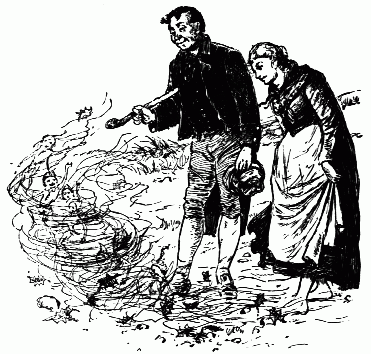 "GOD SPEED YOU, GENTLEMEN!"
"GOD SPEED YOU, GENTLEMEN!"
Fairies had their followers and votaries from[16] early times. Nothing in the Bible hints that they were known among the heathens with whom the Israelites warred; nothing in classic mythology has any approach to them, except the beautiful wood and water-nymphs. Yet poet Homer, Pliny the scientist, and Aristotle the philosopher, had some notion of them, and of their influence. In old China, whole mountains were peopled with them, and the coriander-seeds grown in their gardens[17] gave long life to those who ate of them. The Persians had a hierarchy of elves, and were the first to set aside Fairyland as their dwelling-place. Saxons, in their wild forests, believed in tiny dwarves or demons called Duergar. Celtic countries, Scotland, Brittany, Ireland, Wales, were always crowded with them. In the "uttermost mountains of India, under a merry part of heaven," or by the hoary Nile, according to other writers, were the Pigmeos, one cubit high, full-grown at three years, and old at seven, who fought with cranes for a livelihood. And the Swiss alchemist, Paracelsus (a most pompous and amusing old bigwig), wrote that in his day all Germany was filled with fairies two feet long, walking about in little coats!
Their favorite color, noticeably in Great Britain, was green; the majority of them wore it, and grudged its adoption by a mortal. Sir Walter Scott tells us that it was a fatal hue to several families in his country, to the entire gallant race of Grahames in particular; for in battle a Grahame was almost always shot through the green[18] check of his plaid. French fairies went in white; the Nis of Jutland, and many other house-sprites, in red and gray, or red and brown; and the plump Welsh goblins, whose holiday dress was also white, in the gayest and most varied tints of all. In North Wales were "the old elves of the blue petticoat"; in Cardiganshire was the familiar green again, though it was never seen save in the month of May; and in Pembrokeshire, a uniform of jolly scarlet gowns and caps. The fairy gentlemen were quite as much given to finery as the ladies, and their general air was one of extreme cheerful dandyism. Only the mine and ground-fairies were attired in sombre colors. Indeed, their idea of clothes was delightfully liberal; an elf bespoke himself by what he chose to wear; and fashions ranged all the way from the sprites of the Orkney Islands, who strutted about in armor, to the little Heinzelmänchen of Cologne, who scorned to be burdened with so much as a hat!
People accounted in strange ways for their origin. A legend, firmly held in Iceland, says that once upon a time Eve was washing a number of[19] her children at a spring, and when the Lord appeared suddenly before her, she hustled and hid away those who were not already clean and presentable; and that they being made forever invisible after, became the ancestors of the "little folk," who pervade the hills and caves and ruins to this day. In Ireland and Scotland fairies were spoken of as a wandering remnant of the fallen angels. The Christian world over, they were deemed either for a while, or perpetually, to be locked out from the happiness of the blessed in the next world. The Bretons thought their Korrigans had been great Gallic princesses, who refused the new faith, and clung to their pagan gods, and fell under a curse because of their stubbornness. The Small People of Cornwall, too, were imagined to be the ancient inhabitants of that country, long before Christ was born, not good enough for Heaven, and yet too good to be condemned altogether, whose fate it is to stray about, growing smaller and smaller, until by and by they vanish from the face of the earth.
Therefore the poor fairy-folk, with whom theology[20] deals so rudely, were supposed to be tired waiting, and anxious to know how they might fare everlastingly; and they waylaid many mortals, who, of course, really could tell them nothing, to ask whether they might not get into Heaven, by chance, at the end. It was their chief cause of doubt and melancholy, and ran in their little minds from year to year. And since we shall revert no more to the sad side of fairy-life, let us close with a most sweet story of something which happened in Sweden, centuries ago.
Two boys were gambolling by a river, when a Neck rose up to the air, smiling, and twanging his harp. The elder child watched him, and cried mockingly: "Neck! what is the good of your sitting there and playing? You will never be saved!" And the Neck's sensitive eyes filled with tears, and, dropping his harp, he sank forlornly to the bottom. But when the brothers had gone home, and told their wise and saintly father, he said they had been thoughtlessly unkind; and he bade them hurry back to the river, and comfort the little water-spirit. From afar off they saw him again on the[21] surface, weeping bitterly. And they called to him: "Dear Neck! do not grieve; for our father says that your Redeemer liveth also." Then he threw back his bright head, and, taking his harp, sang and played with exceeding gladness until sunset was long past, and the first star sent down its benediction from the sky.
They saved themselves no end of trouble by setting up the local barometer as their standard. The only Bible they knew was the weather, and they followed it stoutly. Whatever the climate was, whatever it had helped to make the grown-up nation who lived under it, that, every time, were the "brownies and bogles." Where the land was[23] rocky and grim, and subject to wild storms and sudden darknesses, the fairies were grim and wild too, and full of wicked tricks. Where the landscape was level and green, and the crops grew peacefully, they were tame, as in central England, and inclined to be sentimental.
And they copied the distinguishing traits of the race among whom they dwelt. A frugal Breton fairy spoke the Breton dialect; the Neapolitan had a tooth for fruits and macaroni; the Chinese was ceremonious and stern; a true Provençal fée was as vain as a peacock, flirting a mirror before her, and an Irish elf, bless his little red feathered caubeen! was never the man to run away from a fight.
If you look on the map, and see a section of coast-line like that of Cornwall or Norway, a sunshiny, perilous, foamy place, make up your mind that the fairies thereabouts were fellows worth knowing; that you would have needed all your wit and pluck to get the better of them, and that they would have made live, hearty playmates, too, while in good humor, for any brave boy or girl.
We do not know nearly so much about the genuine fairies as we should like. They must have been, at one time or another, in every European country. Most of the Oriental spirits were taller, and of another brood; they figured either as demons, or as what we should now call angels. But in the Germanic colonies, from very old days, fairy-lore was finely developed, and we count up tribe on tribe of necks, nixies, stromkarls and mermaids, who were water-sprites; of bergmännchen (little men of the mountain), and lovely wild-women in hilly places; of trolls around the woods and rocks; of elves in the air, and gnomes or duergars in caverns or mines. Yet from Portugal, and Russia, and Hungary, and from our own North American Indians, we learn so little that it is not worth counting.
If the good dear peasants who were acquainted with the fairies had made more rhymes about them, and handed them down more attentively; if it had occurred to the knowing scholar-monks to keep diaries of elfin doings, as it would have done had they but known how soon their little friends were[25] to be extinct, like the glyptodon and the dodo, how wise should we not be!
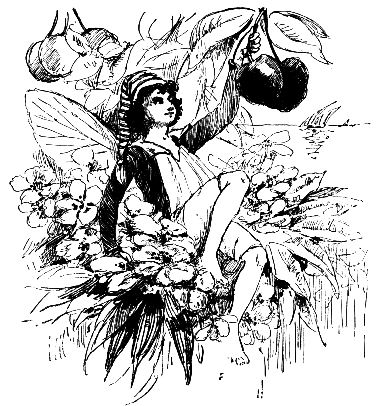 THE NEAPOLITAN FAIRY.
THE NEAPOLITAN FAIRY.
But again, though there were hosts of supernatural beings in the beliefs of every old land, we have no business with any but the wee ones. And as these were settled most thickly in the Teutonic, Celtic and Cymric countries, we will[26] turn our curiosity thither, without farther grumbling, and be glad to get so much authentic news of them as we may.
Fairies, as a whole, seem at bottom rather weak and disconsolate. For all of their magic and cunning, for all of their high station, and its feasting and glory, they could not keep from seeking human sympathy. They did, indeed, hurt men, resent intrusions, foretell the future, and call down disease and storm, but they stood in awe of the weakest mortal because of his superior strength and size; they came to him to borrow food and medicine, and even to ask the loan of his house for their revels. They rendered themselves invisible, but he had always at his feet the fern-seed, the talisman of four-leaved clover (or, as in Scotland, the leaf of the ash or rowan-tree), with which he could defeat their design, and protect himself against the attacks of any witch, imp, or fairy whatsoever.
Their government was a happy-go-lucky affair. The various tribes of fairies had no common interests which would make them sigh for post-offices, or cables, or general synods. Each set of them[27] got along, independent of the rest. Once in a while a mine-man would live alone with his wife, pegging away at his daily work, without any idea of hurrahing for his King or, more likely, his Queen; or even of hunting up his own cousins in the next county.
If we had elves in the United States nowadays, they would no doubt be American enough to elect a President and have him as honest, and steady, and sound-hearted as needs be. But dwelling as they did in feudal days, they set up thrones and sceptres all over Fairydom.
According to the poets, Mab and Oberon are the crowned rulers of the little people. In reality, they had no supreme head. Among many parties and factions, each small agreeing community had its own chief, the tallest of his race, who was no chief at all, mind you, to the fairy neighbors a mile east. The delicate yellow Chinese fairy-mother was Si Wang Mu; and in the Netherlands, the elf-queen, who was also queen of the witches, was called Wanne Thekla.
We snatch an item here and there of the royal[28] histories. We find that the sweet-natured Elberich in the Niebelungen is the same as Oberon. In Germany was a dwarf-king named Goldemar, who lived with a knight, shared his bed, played at dice with him, gave him good advice, called him Brother-in-law very fondly, and comforted him with the music of his harp. But Goldemar, though the knight loved him and could touch and feel him, was unseen. He was like a wreath of blue smoke, or a fragment of moonlight, and you could run a sword through him, and never change his kind smile. His royal hands were lean, and soft, and cold as a frog's. After three years, perhaps when Brother-in-law was dead, or when he was married, and needed him no longer, the gentle dwarf-king disappeared.
Sinnels, Gübich, and Heiling were other dwarf-princes, probably rivals of Goldemar, and ready to have at him till their breath gave out. Their little majesties were quarrelsome as cock-sparrows. The elf-monarch Laurîn was once conquered by Theodoric; and because he had been treacherous in war (which was not "fair" at all, despite the[29] proverb), he got a very sad rebuff to his dignity, in being made fool or buffoon at the court of Bern.
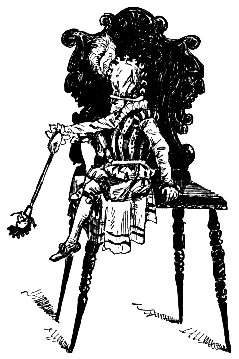 THE ELF-MONARCH WHO WAS MADE
COURT-FOOL.
THE ELF-MONARCH WHO WAS MADE
COURT-FOOL.
We are told in the Mabinogion how the daughter of Llud Llaw Ereint was "the most splendid maiden in the three islands of the mighty," and how for her Gwyn ap Nudd, the Welsh fairy-king, battles every May-day from dawn until sunset. Gwyn once carried her off from Gwythyr, her true lord; and both lovers were so furious and cruel against each other that blessed King Arthur condemned them to wage bitter fight on each first-of-May till the world's end; and to whomsoever is victorious the greatest[30] number of times, the fair lady shall then be given. Let us hope the reward will not fall to thieving Gwyn.
We have said that we should do pretty much as we pleased in ranging the myriad fairy-folk into ranks and species. If, as we prowl about, we see a baby in the house of the Elfsmiths, who has a look of the Elfbrowns, we will immediately kidnap him from his fond parents, and add him to the family he resembles. Now that might make wailing and confusion, and bring down vengeance on our heads, if there were any Queen Mab left to rap us to order; but as things go, we shall find it a very neat way of smoothing difficulties.
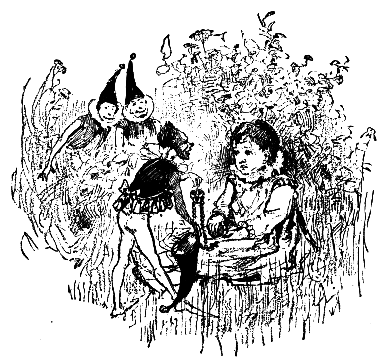 THE ISLE OF RÜGEN DWARVES THAT GIVE PRESENTS TO
CHILDREN.
THE ISLE OF RÜGEN DWARVES THAT GIVE PRESENTS TO
CHILDREN.
Of course there are certain pigwidgeons too accomplished, too slippery, too many things in one, to be ticketed and tied down like the rest; such versatile fellows as the Brown Dwarves of the Isle of Rügen, for instance. They lived in what were called the Vine-hills, and were not quite eighteen inches high. They wore little snuff-brown jackets and a brown cap (which made them invisible, and allowed them to pass through the smallest keyhole),[31] with one wee silver bell at its peak, not to be lost for any money. But they did some roguish things; and children who fell into their hands had to serve them for fifty years! With caprice usual to their kin, they will, on other occasions, befriend and protect children, and give them presents; or plague untidy servants, like Brownie, or lead travellers astray by night into bogs and[32] marshes, like the Ellydan and the Fir-Darrig, and mischievous double-faced Robin Goodfellow himself.
An ancient tradition says that while the grass-blades are sprouting at the root, the earth-elves water and nourish them; and the moment the growth pierces the soil, affectionate air-elves take it in charge. Therefore we borrow a hint from the grass; and after first going down among the swarthy fairies who burrow underground, we shall pass up to companionship with little beings so beautiful that wherever they flock there is starlight and song.
We will follow the Norse folk. If we were required to group human beings under two headings, we should choose that same Good and Evil, because the division occurs to one naturally, because it saves time, and because everybody comprehends it, and sees that it is based upon law; and so do we deal with our wonder-friends, who have the strange moral sorcery belonging to each of us their masters, to help or to harm.
The evil fairies, then, were the scowling underground tribes, who hid themselves from the frank[34] daylight, and the open reaches of the fields. Yet just as the good fairies had many a sad failing to offset their grace and charm, the grim, dark-skinned manikins had sudden impulses towards honor and kindness. In fact, as we noted before, they were astonishingly like our fellow-creatures, of whom scarce any is entirely faultless, or entirely warped and ruined.
For instance, the Hill-men, in Switzerland, were very generous-minded; they drove home stray lambs at night, and put berry-bushes in the way of poor children. And the more modern Dwarves of Germany, frequenting the clefts of rocks, were silent, mild, and well-disposed, and apt to bring presents to those who took their fancy. Like others of the elf-kingdom, they loved to borrow from mortals. Once a little bowing Dwarf came to a lady for the loan of her silk gown for a fairy-bride. (You can imagine that, at the ceremony, the groom must have had a pretty hunt among the wilderness of finery to get at her ring-finger!) Of course the lady gave it; but worrying over its tardy return, she went to the Dwarves' hill and[35] asked for it aloud. A messenger with a sorrowful countenance brought it to her at once, spotted over and over with wax. But he told her that had she been less impatient every stain would have been a diamond!
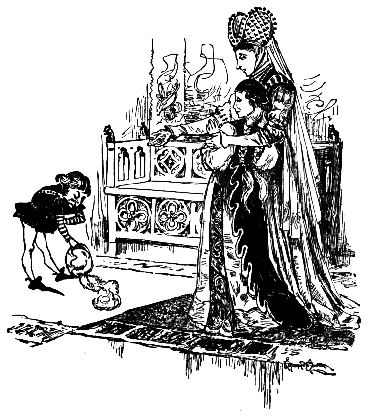 THE DWARF THAT BORROWED THE SILK GOWN.
THE DWARF THAT BORROWED THE SILK GOWN.
The huge, terrible, ogre-like Hindoo Rakshas, the weird Divs and Jinns of Persia, and the ancient[36] demon-dwarves of the south called Panis, may be considered the foster-parents of our dwindled minims, as the glorious Peris on the other hand gave their name, and some of their qualities, to a little European family of very different ancestry.
The Black Elves will serve as our general name for dwarves and mine-fairies. These are closely connected in all legends, live in the same neighborhoods, and therefore claim a mention together. They have four points in common: dark skin; short, bulky bodies; fickle and irritable natures; and occupations as miners, misers, or metalsmiths. And because of their exceeding industry, on the old maxim's authority, where all work and no play made Jack a dull boy, they are curiously heavy-headed and preposterous jacks; and, waiving their plain faces, not in any wise engaging. Yet perhaps, being largely German, they may be philosophers, and so vastly superior to any little gabbling, somersaulting ragamuffin over in Ireland.
In the Middle Ages, they were described as withered and leering, with small, sharp, snapping[37] black eyes, bright as gems; with cracked voices, and matted hair, and horns peering from it! and as if that were not enough adornment, they had claws, which must have been filched from the ghosts of mediæval pussy-cats, on their fingers and toes.
The first Duergars belonging to the Gotho-German mythology, were muscular and strong-legged; and when they stood erect, their arms reached to the ground. They were clever and expert handlers of metal, and made of gold, silver and iron, the finest armor in the world. They wrought for Odin his great spear, and for Thor his hammer, and for Frey the wondrous ship Skidbladnir.
Long ago, too, armor-making Elves, black as pitch, lived in Svart-Alfheim, in the bowels of the earth, and were able, by their glance or touch or breath, to cause sickness and death wheresoever they wished.
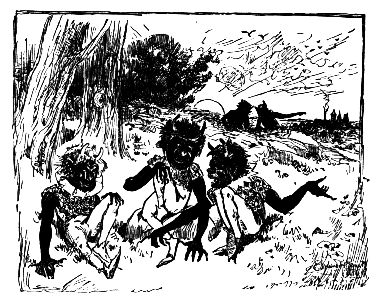 THE BLACK DWARVES OF RÜGEN PLANNING MISCHIEF.
THE BLACK DWARVES OF RÜGEN PLANNING MISCHIEF.
Still uglier were the Black Dwarves of the mysterious Isle of Rügen; nor had they any frolicsome or cordial ways which should bring up our opinion of them. Their pale eyes ran water, and[38] every midnight they mewed and screeched horribly from their holes. In idle summer-hours they sat under the elder-trees, planning by twos and threes to wreak mischief on mankind. They, as well, were once useful, if not beautiful; for in the days when heroes wore a panoply of steel, the Black Dwarves wrought fair helmets and corselets of cobwebby mail which no lance could pierce, and swords flexible as silk which could unhorse the mightiest foe. The little blackamoors frequented mining districts, and dug for ore on their[39] own account. They were said to be very rich, owning unnumbered chests stored underground. The most exciting tales about gnomes of all nations were founded on the efforts of daring mortals to get possession of their wealth.
To the mining division belong the dwarf-Trolls of Denmark and Sweden (for there were giant-Trolls as well), and the whimsical Spriggans of Cornwall. The Trolls burrowed in mounds and hills, and were called also Bjerg-folk or Hill-folk; they lived in societies or families, baking and brewing, marrying and visiting, in the old humdrum way. They made fortunes, and hoarded up heaps of money. But they were often obliging and benevolent; it gave them pleasure to bestow gifts, to lend and borrow, and sometimes, alas! to steal. They played prettily on musical instruments, and were very jolly. People used to see the stumpy little children of the genteel Troll who lived at Kund in Jutland, climbing up the knoll which was the roof of their own house, and rolling down one after the other with shouts of laughter. The Trolls were famous gymnasts, and very plump and[40] round. Our word "droll" is left to us in merry remembrance of them.
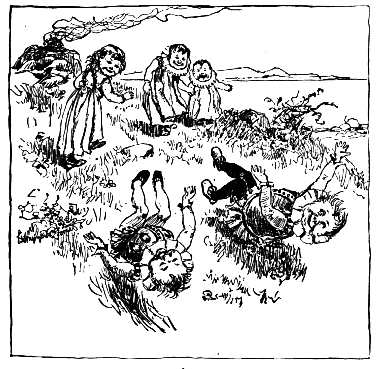 THE TROLL'S CHILDREN.
THE TROLL'S CHILDREN.
They were tractable creatures, as you may know from the tale of the farmer, who, ploughing an angry Troll's land, agreed, for the sake of peace, to go halves in the crops sown upon it, so that one year the Troll should have what grew above ground, and the next year what grew under. But the sly farmer planted radishes and carrots, and[41] the Troll took the tops; and the following season he planted corn; and his queer partner gathered up the roots and marched off in triumph. Indeed, it was so easy to outwit the simple Troll that a generous farmer would never have played the game out, and we should have lost our little story. It was mean to take advantage of the sweet fellow's trustfulness. There was an English schoolmaster once, a man wise, firm, and kind, and of vast influence, of whom one of his boys said to another: "It's a shame to tell a lie to Arnold; he always believes it." That was a ray of real chivalry.
The Spriggans were fond of dwelling near walls and loose stones, with which it was unlucky to tamper, and where they slipped in and out with suspicious eyes, guarding their buried treasure. If a house was robbed, or the cattle were carried away, or a hurricane swooped down on a Cornish village, the neighbors attributed their trouble to the Spriggans; whereby you may believe they had fine reputations for meddlesomeness. Their cousins, the Buccas, Bockles or Knockers, were[42] gentlemen who went about thumping and rapping wherever there was a vein of ore for the weary workmen, cheating, occasionally, to break the monotony.
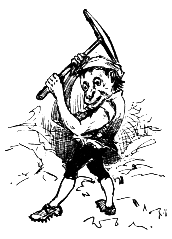 A COBLYNAU.
A COBLYNAU.
The Welsh Coblynau followed the same profession, and pointed out the desired places in mines and quarries. The Coblynau were copper-colored, and very homely, as were all the pigmies who lived away from the sun; they were busybodies, half-a-yard high, who imitated the dress of their friends the miners, and pegged away at the rocks, like them, with great noise and gusto, accomplishing nothing. Their houses were far-removed from mortal vision, and unlike certain proper children, now obsolete, the Coblynau themselves were generally heard, but not seen.
Their German relation was the Wichtlein (little wight) an extremely small fellow, whom the Bohemians[43] named Hans-schmiedlein (little John Smith!) because he makes a noise like the stroke of an anvil.
Dwarves and mine-men went about, unfailingly, with a purseful of gold. But if anyone snatched it from them, only stones and twine and a pair of scissors were to be found in it. The Leprechaun, or Cluricaune, whom we shall meet later as the fairy-cobbler, was an Irish celebrity who knew where pots of guineas were hidden, and who carried in his pocket a shilling often-spent and ever-renewed. He looked, in this banker-like capacity, a clumsy small boy, dressed in various ways, sometimes in a long coat and cocked hat, unlike the Danish Troll, who kept to homely gray, with the universal little red cap. Even the respectable Kobold, who was, virtually, a house-spirit, caught the fever of fortune-hunting, and often threw up his domestic duties to seek the fascinating nuggets in the mines.
There is a funny anecdote of a Troll who, as was common with his race, cunningly concealed his prize under the shape of a coal. Now a peasant[44] on his way to church one bright Sunday morning saw him trying vainly to move a couple of crossed straws which had blown upon his coal; for anything in the shape of a cross seemed to shrivel up an elf's power in the most startling manner. So the little sprite turned, half-crying, and begged the peasant to move the straws for him. But the man was too shrewd for that, and took up the coal, straws and all, and ran, despite the poor Troll's screaming, and saw, on reaching home, that he had captured a lump of solid gold.
All Black Elves were particular about their neighborhoods, and a whole colony would migrate at once if they took the least offence, or if the villagers about got "too knowing" for them. (An American poet once wrote a sonnet "To Science," in which he berated her for having made him "too knowing," and for having driven
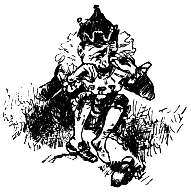 "I CAN'T STAY ANY LONGER!"
"I CAN'T STAY ANY LONGER!"
Ever since the great god Thor threw his hammer at the Trolls, they have hated noise as much as Mr. Thomas Carlyle, who, however, made Thor's own bluster in the world himself. They sought sequestered places that they might not be disturbed. The Prussian mites near Dardesheim were frightened away by the forge and the factory. Above all else, church-bells distressed them, and spoiled their tempers. A huckster once passed a Danish Troll, sitting disconsolately on a stone, and asked him what the matter might be. "I hate to leave this country," blubbered the fat mourner, "but I can't stay where there is such an eternal ringing and dinging!"
But they changed character as centuries passed; and they came to resemble the fairies of Great Britain in their extreme waywardness and fickleness. For though they were fair and benevolent most of the time, they could be, when it so pleased them, ugly and hurtful; and what they could be, they very often were; for fairies were not expected to keep a firm rein on their moods and tempers.
Norwegian peasants described some of their Huldrafolk as tiny bare boys, with tall hats; and[47] in Sweden, as well, they were slender and delicate. When a Swedish elf-maid or moon-maid wished to approach the inmates of a house, she rode on a sunbeam through the keyhole, or between the openings in a shutter.
The German wild-women were like them, going about alone, and having fine hair flowing to their feet. They had some odd traits, one of which was sermonizing! and exhorting stray mortals who had done them a service, to lead a godly life.
The elle-maid in Denmark and in neighboring countries was always winsome and graceful, and carried an enchanted harp. She loved moonlight best, and was a charming dancer. But her evil element was in her very beauty, with which she entrapped foolish young gentlemen, and waylaid them, and carried them off who knows whither? She could be detected by the shape of her back, it being hollow, like a spoon; which was meant to show that there was something wrong with her, and that she was not what she seemed, but fit only for the abhorrence of passers-by. The elle-man, her mate, was old and ill-favored, a disagreeable[48] person; for if any one came near him while he was bathing in the sun, he opened his mouth and breathed pestilence upon them.
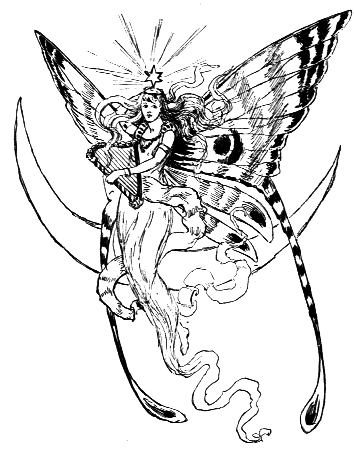 AN ELLE-MAID, OF DENMARK.
AN ELLE-MAID, OF DENMARK.
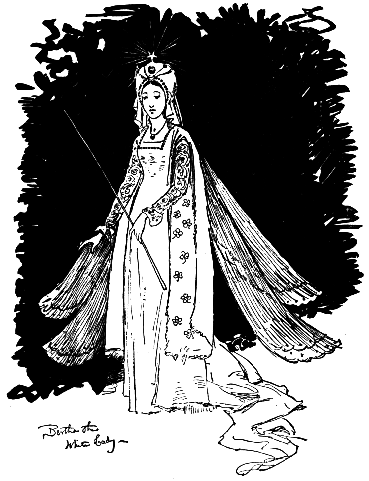 BERTHA, THE WHITE LADY.
BERTHA, THE WHITE LADY.
A common trait of the air-fairies was to assist at a birth and give the infant, at their will, good and bad gifts. Dame Bertha, the White Lady of[49] Germany, came to the birth of certain princely babes, and the Korrigans made it a general practice. Whenever they nursed or tended a new-born mortal, bestowed presents on him and foretold his destiny, one of the little people was almost[50] always perverse enough to bestow and foretell something unfortunate. You all know Grimm's beautiful tale of Dornröschen, which in English we call The Sleeping Beauty, where the jealous thirteenth fairy predicts the poor young lady's spindle-wound. Around the famous Roche des Fées in the forest of Theil, are those who believe yet that the elves pass in and out at the chimneys, on errands to little children.
The modern Greek fairies haunted trees, danced rounds, bathed in cool water, and carried off whomsoever they coveted. A person offending them in their own fields was smitten with disease.
The Chinese Shan Sao were a foot high, lived among the mountains, and were afraid of nothing. They, too, were revengeful; for if they were attacked or annoyed by mortals, they "caused them to sicken with alternate heat and cold." Bonfires were burnt to drive them away.
The innocent White Dwarves of the Isle of Rügen in the Baltic Sea, made lace-work of silver, too fine for the eye to detect, all winter long; but came idly out into the woods and fields with returning[51] spring, leaping and singing, and wild with affectionate joy. They were not allowed to ramble about in their own shapes; therefore they changed themselves to doves and butterflies, and winged their way to good mortals, whom they guarded from all harm.
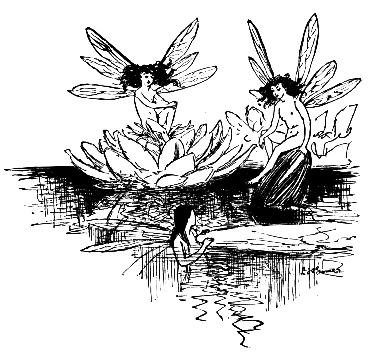 SOME GREEK FAIRIES.
SOME GREEK FAIRIES.
The Korrigans of Brittainy, mentioned a while ago, were peculiar in many ways. They had beautiful singing voices and bright eyes, but they never[52] danced. They preferred to sit still at twilight, like mermaids, combing their long golden hair. The tallest of them was nearly two feet high, fair as a lily, and transparent as dew itself, yet able as the rest to seem dark, and humpy, and terrifying. He who passed the night with them, or joined in their sports, was sure to die shortly, since their very breath or touch was fatal. And again, as in the case of Seigneur Nann, about whom a touching Breton ballad was made, they doomed to death any who refused to marry one of them within three days.
Of the American Indian fairies we do not know much. In Mr. Schoolcraft's books of Indian legends there is a beautiful little Bone-dwarf, who may almost be considered a fairy. In the land of the Sioux they tell the pretty story of Antelope and Karkapaha, and how the wee warrior-folk, thronging on the hill, clad in deerskin, and armed with feathered arrow and spear, put the daring heart of a slain enemy into the breast of the timid lover, Karkapaha, and made him worthy both to win and keep his lovely maiden, and to deserve[53] homage for his bravery, from her tribe and his. Some of you will remember one thing against the Puk-Wudjies, which is an Algonquin name meaning "little vanishing folk," to wit: that they killed Hiawatha's friend, "the very strong man Kwasind," as our Longfellow called him. He had excited their envy, and they flung on his head, as he floated in his canoe, the only thing on earth that could kill him, the seed-vessel of the white pine.
The Scotch, Irish and English overground fairies were, as a general thing, very much alike. They had the power of becoming visible or invisible, compressing or enlarging their size, and taking any shape they pleased. When an Irish Shefro was disturbed or angry, and wanted to get a house or a person off her grounds, she put on the strangest appearances: she could crow, spit fire, slap a tail or a hoof about, grin like a dragon, or give a frightful, weird, lion-like roar. Of course the object of her polite attentions thought it best to oblige her. If she and her companions were anxious to enter a house, they lifted the spryest of their number to the keyhole, and pushed him[54] through. He carried a piece of string, which he fastened to the inside knob, and the other end to a chair or stool; and over this perilous bridge the whole giggling tribe marched in one by one. The Irish and Scotch fays were more mischievous than the English, but have not fared so well, having had no memorable verses made about them. The little Scots were sometimes dwarfish wild creatures, wrapped in their plaids, or, oftener, comely and yellow-haired; the ladies in green mantles, inlaid with wild-flowers; and dapper little gentlemen in green trousers, fastened with bobs of silk. They carried arrows, and went on tiny spirited horses, as did the Welsh fairies, "the silver bosses of their bridles jingling in the night-breeze." An old account of Scotland says that they were "clothed in green, with dishevelled hair floating over their shoulders, and faces more blooming than the vermeil blush of a summer morning."
Their Welsh cousins were many. A native poet once sang of them:
King James i. of England mentions in his Dæmonology a "King and Queene of Phairie: sic a jolie courte and traine as they had!" Nothing could have exceeded the state and elegance of their ceremonious little lives. According to a sweet old play, they had houses made all of mother-of-pearl, an ivory tennis-court, a nutmeg parlor, a sapphire dairy-room, a ginger hall; chambers of agate, kitchens of crystal, the jacks of gold, the spits of Spanish needles! They dressed in imported cobweb! with a four-leaved clover, lined with a dog-tooth violet, for overcoat; and they ate (think of eating such a pretty thing!) delicious rainbow-tart, the trout-fly's gilded wing, and
Their English dwellings were often in the bubble-castles of sunny brooks; and the bright-jacketed hobgoblins took their pleasure sitting under toadstools, or paddling about in egg-shell boats, playing jew's-harps large as themselves. Beside the freehold of blossomy hillocks and dingles, they had dells of their own, and palaces, with everything lovely in them; and whatever they longed for was to be had for the wishing. They had fair gardens in clefts of the Cornish rocks, where vari-colored flowers, only seen by moonlight, grew; in these gardens they loved to walk, tossing a posy to some mortal passing by; but if he ever gave it away they were angry with him forever after. They liked to fish; and the crews put out to sea in funny uniforms of green, with red caps. They travelled on a fern, a rush, a bit of weed, or even boldly bestrode the bee and the dragon-fly; and they went to the chase, as in the Isle of Man, on full-sized horses whenever they could get them! and when it came to time of war, their armies laid-to like Alexander's own, with mushroom-shield and bearded grass-blades for mighty spears,[58] and honeysuckle trumpets braying furiously! There are traditions of battles so vehement and long that the cavalry trampled down the dews of the mountain-side, and sent many a peerless fellow, at every charge, to the fairy hospitals and cemeteries.
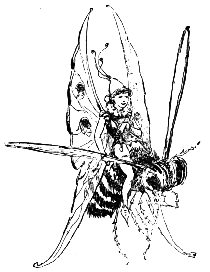 AN ELF-TRAVELLER.
AN ELF-TRAVELLER.
Their chief and all but universal amusement, sacred to moonlight and music, was dancing hand-in-hand; and what was called a fairy-ring was the swirl of grasses in a field taller and deeper green than the rest, which was supposed to mark their circling path. Inside these rings it was considered very dangerous to sleep, especially after sundown. If you put your foot within them, with a companion's foot upon your own, the elfin tribe became visible to you, and you heard their tinkling laughter; and if, again, you wished a charm[59] to defy all their anger, for they hated to be overlooked by mortal eyes, you had merely to turn your coat inside out. But a house built where the wee folks had danced was made prosperous.
Hear how deftly old John Lyly, nearly four hundred years ago, put the dancing in his lines:
For the elves, as we know, were governed generally by a queen, who bore a white wand, and stood in the centre while her gay retainers skipped about her. Fairy-rings were common in every Irish parish. At Alnwick in Northumberland County in England, was one celebrated from antiquity; and it was believed that evil would befall any who ran around it more than nine times. The children were constantly running it that often; but nothing could tempt the bravest of them all to go one step farther. In France, as in Wales, the fairies guarded the cromlechs with care, and preferred to hold revel near them.
At these merry festivals, in the pauses of action, meat and drink were passed around. A Danish ballad tells how Svend-Fälling drained a horn presented by elf-maids, which made him as strong as twelve men, and gave him the appetite of twelve men, too; a natural but embarrassing consequence. It used to be proclaimed that any one daring enough to rush on a fairy feast, and snatch the drinking-glass, and get away with it, would be lucky henceforward. The famous goblet, the Luck of Edenhall, was seized after that fashion, by one of the Musgraves; whereat the little people disappeared, crying aloud:
In the Song of Sir Olaf, we are told how he fell in, while riding by night, with the whirling elves; and how, after their every plea and threat that he should stay from his to-be-wedded sweetheart at home, and dance, instead, with them, he hears the weird French refrain:
All the gay, unsteady, fantastic motion broke up at the morning cock-crow, and instantly the little bacchantes vanished. And, strangest of all! the betraying flash of the dawn showed their peach-like color, their blonde, smooth hair, and bodily agility changed, like a Dead Sea apple, and turned into ugliness and distortion! It was not the lovely vision of a minute back which hurried away on the early breeze, but a crowd of leering, sullen-eyed bugaboos, laughing fiercely to think how they had deceived a beholder.
These, then, were the Light Elves, not all lovable, or loyal, or gentle, as they were expected to be, but cruel to wayfarers like poor Sir Olaf, and treacherous and mocking; beautiful so long as they were good, and hideous when they had done a foul deed. It is hard to say wherein they were better than the Underground Elves, who were, despite some kindly characteristics, professional doers of evil, and had not the choice or chance of being so happy and fortunate. But we record them as we find them, not without the sobering thought that here, as at every point, the fairies are a running commentary on the puzzle of our own human life.
He was a sweet, unselfish fellow; but very wide awake as well, full of mischief, and spirited as a young eagle, when he was deprived of his rights. He belonged to a tribe of great influence and size, and each division of that tribe, inhabiting different countries, bore a different name. But the word Brownie, to English-speaking people, will serve as meaning those fairies who attached themselves persistently to any spot or any family, and who labored in behalf of their chosen home.
The Brownie proper belonged to the Shetland and the Western Isles, to Cornwall, and the Highlands[64] and Borderlands of Scotland. He was an indoor gentleman, and varied in that from our friends the Black and Light Elves. He took up his dwelling in the house or the barn, sometimes in a special corner, or under the roof, or even in the cellar pantries, where he ate a great deal more than was good for him. In the beginning he was supposed to have been covered with short curly brown hair, like a clipped water-spaniel, whence his name. But he changed greatly in appearance. Later accounts picture him with a homely, sunburnt little face, as if bronzed with long wind and weather; dark-coated, red-capped, and shod with noiseless slippers, which were as good as wings to his restless feet. Along with him, in Scotch houses, and in English houses supplanting him, often lived the Dobie or Dobbie who was not by any means so bright and active ("O, ye stupid Dobie!" runs a common phrase), and therefore not to be confounded with him.
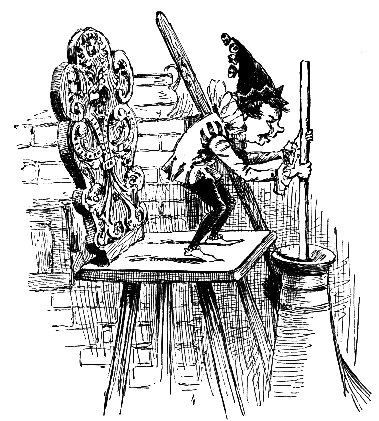 BROWNIE'S DELIGHT WAS TO DO DOMESTIC SERVICE.
BROWNIE'S DELIGHT WAS TO DO DOMESTIC SERVICE.
Brownie's delight was to do domestic service; he churned, baked, brewed, mowed, threshed, swept, scrubbed, and dusted; he set things in order,[65] saved many a step to his mistress, and took it upon himself to manage the maid-servants, and reform them, if necessary, by severe and original measures. Neatness and precision he dearly loved, and never forgot to drop a penny over-night in the shoe of the person deserving well of him. But lax offenders he pinched black and blue, and[66] led them an exciting life of it. His favorite revenge, among a hundred equally ingenious, was dragging the disorderly servant out of bed. A great poet announced in Brownie's name:
Like all gnomes truly virtuous, he could be the worst varlet, the most meddlesome, troublesome, burdensome urchin to be imagined, when the whim was upon him. At such times he gloried in undoing all his good deeds; and by way of emphasizing his former tidiness and industry, he tore curtains, smashed dishes, overturned tables, and made havoc among the kitchen-pans. All this was done in a sort of holy wrath; for be it to Brownie's credit, that if he were treated with courtesy, and if the servants did their own duties honestly, he was never other than his gentle, well-behaved, hard-working little self.
He asked no wages; he had a New England scorn of "tipping," when he had been especially obliging; and he could not be wheedled into accepting even so much as a word of praise. A farmer at Washington, in Sussex, England, who had often been surprised in the morning at the large heaps of corn threshed for him during the night, determined at last to sit up and watch what went on. Creeping to the barn-door, and peering through a chink, he saw two manikins working away with their fairy flails, and stopping an instant now and then, only to say to each other: "See how I sweat! See how I sweat!" the very thing which befell Milton's "lubbar fiend" in L'Allegro. The farmer, in his pleasure, cried: "Well done, my little men!" whereupon the startled sprites uttered a cry, and whirled and whisked out of sight, never to toil again in his barn.
It is said that not long ago, there was a whole tribe of tiny, naked Kobolds (Brownie's German name) called Heinzelmänchen, who bound themselves for love to a tailor of Cologne, and did, moreover, all the washing and scouring and kettle-cleaning[68] for his wife. Whatever work there was left for them to do was straightway done; but no man ever beheld them. The tailor's prying spouse played many a ruse to get sight of them, to no avail. And they, knowing her curiosity and grieved at it, suddenly marched, with music playing, out of the town forever. People heard their flutes and viols only, for none saw the little exiles themselves, who got into a boat, and sailed "westward, westward!" like Hiawatha, and the city's luck is thought to have gone with them.
But Brownie, who would take neither money, nor thanks, nor a glance of mortal eyes, and who departed in high dudgeon as soon as a reward was offered him, could be bribed very prettily, if it were done in a polite and secretive way. He was not too scrupulous to pocket whatever might be dropped on a stair, or a window-sill, where he was sure to pass several times in a day, and walk off, whistling, to keep his own counsel, and say nothing about it. And for goodies, mysterious goodies left in queer places by chance, he had excellent tooth. Housewives, from the era of[69] the first Brownie, never failed slyly to gladden his favorite haunt with the dish which he liked best, and which, so long as it was fresh and plentiful, he considered a satisfactory squaring-up of accounts. One of these desired treats was knuckled cakes, made of meal warm from the mill, toasted over the embers, and spread with honey. To other tidbits, also, he was partial; but, first and last, he relished his bowl of cream left on the floor overnight. Cream he drank and expected the world over; and in Devon, and in the Isle of Man, he liked a basin of water for a bath.
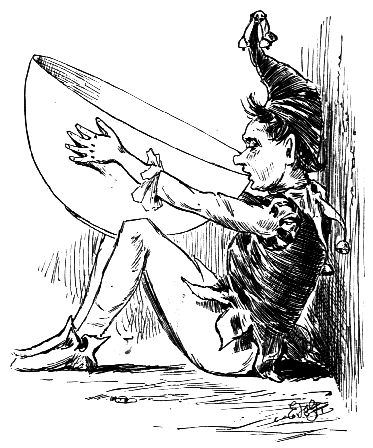 BROWNIE RELISHES HIS BOWL OF CREAM.
BROWNIE RELISHES HIS BOWL OF CREAM.
Fine clothes were quite to his mind; he was very vain when he had them; and it was what Pet Marjorie called "majestick pride," and no whim of anger or sensitiveness, which sent him hurrying off the moment his wardrobe was supplied by some grateful housekeeper, to eschew work forever after, and set himself up as a gentleman of leisure. Many funny stories are told of his behavior under an unexpected shower of dry goods. Brownie, who in his humble station, was so steadfast and sensible, had his poor head completely[70] turned by the vision of a new bright-colored jacket. The gentle little Piskies or Pixies of Devonshire, who are of the Brownie race, and very different from the malicious Piskies in Cornwall, were likewise great dandies, and sure to decamp as soon as ever they obtained a fresh cap[71] or petticoat. Indeed, they dropped violent hints on the subject. Think of a sprite-of-all-work, recorded as being too proud to accept any regular payment even in fruit or grain, standing up brazenly before his mistress, his sly eyes fixed on her, drawling out this absurd, whimpering rhyme (for Piskies scorned to talk prose!):
The moment the Brownie-folk could cut a respectable figure in fashionable garments, they turned their backs on an honest living, and skurried away to astonish the belles in Fairyland.
Very much the same thing befell some German[72] house-dwarves, who used to help a poor smith, and make his kettles and pans for him. They took their milk evening by evening, and went back gladly to their work, to the smith's great profit and pleasure. When he had grown rich, his thankful wife made them pretty crimson coats and caps, and laid both where the wee creatures might stumble on them. But when they had put the uniforms on, they shrieked "Paid off, paid off!" and, quitting a task half-done, returned no more.
The Pisky was not alone in his bold request for his sordid little heart's desire. A certain Pück lived thirty years in a monastery in Mecklenburg, Germany, doing faithful drudgery from his youth up; and one of the monks wrote, in his ingenious Latin, that on going away, all he asked was "tunicam de diversis coloribus, et tintinnabulis plenam!" You may put the goblin's vanity into English for yourselves. Brownie is known as Shelley-coat in parts of Scotland, from a German term meaning bell, as he wears a bell, like the Rügen Dwarves, on his parti-colored coat.
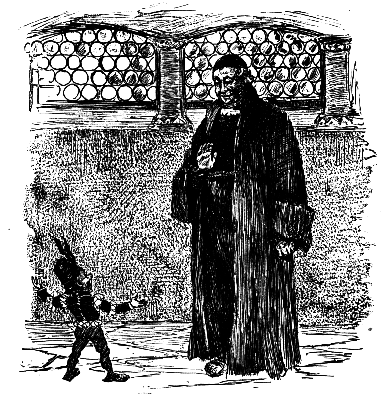 "Tunicam de diversis coloribus, et tintinnabulis plenam!" was
all that pück demanded.
"Tunicam de diversis coloribus, et tintinnabulis plenam!" was
all that pück demanded.
The famous Cauld Lad of Hilton was considered a Brownie. If everything was left well-arranged in the rooms, he amused himself by night with pitching chairs and vases about; but if he found the place in confusion, he kindly went to work and put it in exquisite order. But the Cauld Lad was, more likely, by his own confession,[74] a ghost, and no true fairy. Romances were told of him, and he had been heard to sing this canticle, which makes you wonder whether he had ever heard of the House that Jack Built:
But the merriest grig of all the Brownies was called in Southern Scotland, Wag-at-the-Wa'. He teased the kitchen-maids much by sitting under their feet at the hearth, or on the iron crook which hung from the beam in the chimney, and which, of old, was meant to accommodate pots and kettles. He loved children, and he loved jokes; his laugh was very distinct and pleasant; but if he heard of anybody drinking anything stronger than home-brewed ale, he would cough[75] virtuously, and frown upon the company. Now Wag-at-the-Wa' had the toothache all the time, and, considering his twinges, was it not good of him to be so cheerful? He wore a great red-woollen coat and blue trousers, and sometimes a grey cloak over; and he shivered even then, with one side of his poor face bundled up, till his head seemed big as a cabbage. He looked impish and wrinkled, too, and had short bent legs. But his beautiful, clever tail atoned for everything, and with it, he kept his seat on the swinging crook.
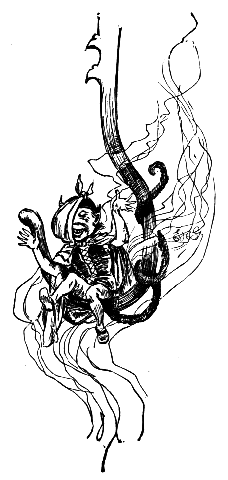 "WAG-AT-THE-WA'."
"WAG-AT-THE-WA'."
Scotch fairies called Powries and Dunters[76] haunted lonely Border-mansions, and behaved like peaceable subjects, beating flax from year to year. The Dutch Kaboutermannekin worked in mills, as well as in houses. He was gentle and kind, but "touchy," as Brownie-people are. Though he dressed gayly in red, he was not pretty, but boasted a fine green tint on his face and hands. Little Killmoulis was a mill-haunting brother of his, who loved to lie before the fireplace in the kiln. This precious old employee was blest with a most enormous nose, and with no mouth at all! But he had a great appetite for pork, however he managed to gratify it.
Boliéta, a Swiss Kobold, distinguished himself by leading cows safely through the dangerous mountain-paths, and keeping them sleek and happy. His branch of the family lived as often in the trunk of a near tree, as in the house itself.
In Denmark and Sweden was the Kirkegrim, the "church lamb," who sometimes ran along the aisles and the choir after service-time, and to the grave-digger betokened the death of a little child. But there was another Kirkegrim, a proper church-Brownie,[77] who kept the pews neat, and looked after people who misbehaved during the sermon.
As queer as any of these was the Phynodderee, or the Hairy One, the Isle of Man house-helper. He was a wild little shaggy being, supposed to be an exile from fairy society, and condemned to wander about alone until doomsday. He was kind and obliging, and drove the sheep home, or gathered in the hay, if he saw a storm coming.
The Klabautermann was a ship-Brownie, who sat under the capstan, and in time of danger, warned the crew by running up and down the shrouds in great excitement. This eccentric Flying Dutchman had a fiery red head, and on it a steeple-like hat; his yellow breeches were tucked into heavy horseman's boots.
Hüttchen was a German Brownie, who lived at court, but who dressed like a little peasant, with a flapping felt hat over his eyes. The Alraun, a sort of house-imp shorn of all his engaging diligence, was very small, his body being made of a root; he lived in a bottle. If he was thrown away, back he came, persistently as a rubber ball.[78] But that instinct was common to the Brownie race.
The Roman Penates, Vinculi terrei, which brave old Reginald Scott called "domesticall gods," were Brownie's venerable and honorable ancestors. We shall see presently what names their descendants bore in various countries. But the Russian Domovoi we shall not count among them, because they were ghostly, like the poor Cauld Lad, and seem to have been full-sized.
Often the Stœchia, a wayward little black being, went about the house under the shape of a lizard or small snake. He was harmless; his presence was an omen of prosperity; and great care was taken that no disrespect was shown him.
The services of the Para, who was a well-meaning[80] rascal, were rather singular, and not at all indispensable. He had a way of following the neighbor's cows to pasture, and milking them himself, in a calf's fashion, until he had swallowed quart on quart, and was as full as a little hogshead. Then he went home, uncorked his thieving throat, and obligingly emptied every drop of his ill-gotten goods into his master's churn! How his feelings must have been hurt if anybody criticized the cheese and butter!
The Spanish house-goblin was a statelier person, and wore an enormous plumed hat, and threw stones in a stolid and haughty manner at people he disliked. But occasionally the Duende had the form of a little busy friar, like the Monachiello at Naples.
The Lutin, or Gobelin, or Follet of French belief, was likewise a stone-thrower. He was fond of children, and of horses; taking it upon himself to feed and caress his landlord's children when they were good, and to whip them when they were naughty; and he rode the willing horses, and combed them, and plaited their manes into knotty[81] braids, for which, we may fear, the stable-boy never thanked him. He knew, too, how to worry and tease; and certain French mothers threatened troublesome little folk with the "Gobelin:" "Le gobelin vous mangera!" which we may translate into: "The goblin will gobble you!" or into the whimsical lines of an American poet:
The Norwegian Nis was like a strong-shouldered child, in a coat and peaky cap, who carried a pretty blue light at night. He enjoyed hopping or skating across the farmyard under the moon's ray. Dogs he would not allow in his house. If he was first promised a gray sheep for his own, he would teach any one to play the violin. Like many another of the Brownie race, he was a dandy, and loved nothing better than fine clothes.
Tomte of Sweden lived in a tree near the house. He was as tall as a year-old boy, with a[82] knowing old face beneath his cap. In harvest-time he tugged away at one straw, or one grain, until he laid it in his master's barn; for his strength was not much greater than an ant's. If the farmer scorned his diligent little servant, and made fun of his tiny load, all luck departed from him, and the Tomte went away in anger. He liked tobacco, played merry pranks, and doubled up comically when he laughed. But he had another laugh, scoffing and sarcastic, which he sometimes gave at the top of his voice.
Like the Devon Piskies, the Niss-Puk required water left at his disposal over-night. The Nis of Jutland was the Puk of Friesland. He also liked his porridge with butter. He lived under the roof, or in dark corners of the stable and house. He was of the Tomte's size; he wore red stockings on his stumpy little legs, and a pointed red cap, and a long gray or green coat. For soft, easy slippers he had a great longing; and if a pair were left out for him, he was soon heard shuffling in them over the floor. He had long arms, and a big head, and big bright eyes, so that[83] the people of Silt have a saying concerning an inquisitive or astonished person: "He stares like a Puk." Puk, too, played sorry tricks on the servants, and was indignant if he was ever deprived of his nightly bowl of groute.
The Bwbach of Wales churned the cream, and begged for his portion, like a true Brownie; he was a hairy blackamoor with the best-natured grin in the world. But he had an unpleasant habit of whisking mortals into the air, and doing flighty mischiefs generally.
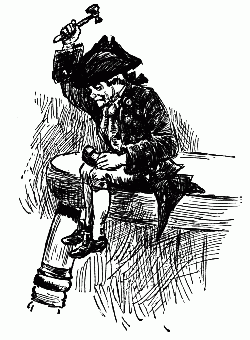 AN IRISH CLURICAUNE.
AN IRISH CLURICAUNE.
The unique Irish Cluricaune, who had that name in Cork, was called Luricaune and Leprechaun in other parts of the country. He differed from the Shefro in living alone, and in his queer appearance and habits. For though he was a house-spirit and did house-work, his ambitions ran in an opposite direction, and in his every spare minute, when he was not smoking or drinking, you might have seen him, a miniature old man, with a cocked hat, and a leather apron, sitting on a low stool, humming a fairy-tune, and perpetually cobbling at a pair of shoes no bigger than acorns.[84] The shoes were occasionally captured and shown. And as we have seen, Mr. Cluricaune was a fortune-hunter, and a very wide-awake, versatile goblin altogether. In his capacity of Brownie, he once wreaked a hard revenge on a maid who served him shabbily. A Mr. Harris, a Quaker, had on his farm a Cluricaune named Little Wildbeam. Whenever the servants left the beer-barrel running through negligence, Little Wildbeam wedged himself into the cock, and stopped the flow, at great inconvenience to his poor little body, until some one came to turn the knob. So the master bade the cook always put a good dinner down cellar for Little Wildbeam. One Friday[85] she had nothing but part of a herring, and some cold potatoes, which she left in place of the usual feast. That very midnight the fat cook got pulled out of bed, and thrown down the cellar-stairs, bumping from side to side, so that it made her very sore indeed, and meanwhile the smirking Cluricaune stood at the head of the steps, and sang at the luckless heap below:
In Japanese houses, even, Brownies were familiar comers and goers. They were important and smooth-mannered pigmies, and serenely dealt out rewards and punishments as they saw fit. When they were engaged in befriending commendable boys and girls, their features had, somehow, the ingenious likeness of letters signifying "good;" and if they made it their business to plague and hinder naughty idlers, who, instead of doing their errands promptly, stopped at the shops to buy goodies, their queer little faces were screwed up[86] to mean "bad," as you see in Japanese artists' pictures.
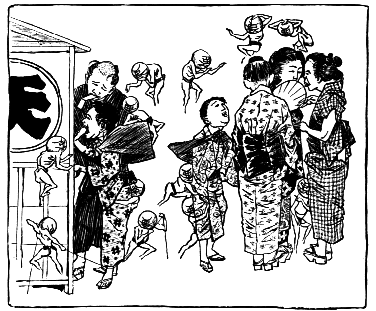 JAPANESE CHILDREN AND BROWNIES.
JAPANESE CHILDREN AND BROWNIES.
The English names for the affable Brownie-folk bring to our minds the most wayward, frolicsome elves of all fairydom. Boggart was the Yorkshire sprite, and the Boggart commonly disliked children, and stole their food and playthings; wherein he differed from his kindly kindred. Hobgoblin (Hop-goblin) was so called because he hopped on one leg. Hobgoblin is the same as Rob or Bob-Goblin, a goblin whose full name[87] seemed to be Robert. Robin Hood, the famous outlaw, dear to all of us, was thought to have been christened after Robin Hood the fairy, because he, too, was tricksy and sportive, wore a hood, and lived in the deep forest.
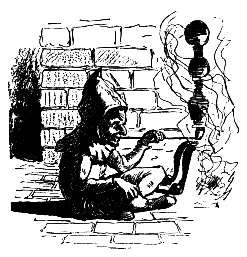 A LITTLE FIR-DARRIG.
A LITTLE FIR-DARRIG.
In Ireland lived the mocking, whimsical little Fir-Darrig, Robin Goodfellow's own twin. He dressed in tight-fitting red; Fir-Darrig itself meant "the red man." He had big humorous ears, and the softest and most flexible voice in the world, which could mimic any sound at will. He sat by the fire, and smoked a pipe, big as himself, belonging to the man of the house. He loved cleanliness, brought good-luck to his abode, and, like a cat, generally preferred places to people.
Puck and Robin Goodfellow were the names[88] best known and cherished. There is no doubt that Shakespeare, from whom we have now our prevailing idea of Puck, got the idea of him, in his turn, from the popular superstitions of his day. But Puck's very identity was all but forgotten, and since Shakespeare was, therefore, his poetical creator, we will forego mention of him here, and entitle Robin Goodfellow, the same "shrewd and meddling elf," under another nickname, the true Brownie of England.
He was both House-Helper and Mischief-Maker, "the most active and extraordinary fellow of a fairy," says Ritson, "that we anywhere meet with." He was said to have had a supplementary brother called Robin Badfellow; but there was no need of that, because he was Robin Badfellow in himself, and united in his whimsical little character so many opposite qualities, that he may be considered the representative elf the world over; for the old Saxon Hudkin, the Niss of Scandinavia, and Knecht Ruprecht, the Robin of Germany, are nothing but our masquerading goblin-friend on continental soil. And in the red-capped smiling[89] Mikumwess among the Passamaquoddy Indians, there he is again!
By this name of Robin he was known earlier than the thirteenth century, and "famosed in everie olde wives' chronicle for his mad merrie prankes," two hundred years later. His biography was put forth in a black-letter tract in 1628, and in a yet better-known ballad which recited his jests, and was in free circulation while Queen Bess was reigning. The forgotten annalist says very heartily, alluding to his string of aliases:
We class him rightly as a Brownie, because he skimmed milk, knew all about domestic life, and was the delight or terror of servants, as the case might be. He was fond of making a noise and clatter on the stairs, of playing harps, ringing bells, and misleading passing travellers; and despite his knavery, he came to be much beloved by his house-mates. Very like him was the German Hempelman,[90] who laughed a great deal. But the laugh of Master Robin sometimes foreboded trouble and death to people, which Hempelman's never did.
The jolly German Kobold had a laugh which filled his throat, and could be heard a mile away. Bu he was a gnome malignant enough if he was neglected or insulted. He very seldom made a mine-sprite of himself, but stayed at home, Brownie-like, and "ran" the house pretty much as he saw fit. To the Dwarves he was, however, closely related, and dressed after their fashion, except that sometimes he wore a coat of as many colors as the rainbow, with tinkling bells fastened to it. He objected to any chopping or spinning done on a Thursday. Change of servants, while he held his throne in the kitchen, affected him not in the least; for the maid going away recommended her successor to treat him civilly, at her peril. A very remarkable Kobold was Hinzelmann, who called himself a Christian, and came to the old castle of Hüdemühlen in 1584; whose history, too long to add here, is given charmingly in Mr. Keightley's Fairy Mythology.
A certain bearded little Kobold lived with some fishermen in a hut, and tried a trick which was quite classic, and reminds one of the Greek story of Procrustes, which all of you have met with, or will meet with, some day. Says Mr. Benjamin Thorpe: "His chief amusement, when the fishermen were lying asleep at night, was to lay them even. For this purpose he would first draw them up until their heads all lay in a straight line, but then their legs would be out of the line! and he had to go to their feet and pull them up until the tips of their toes were all in a row. This game he would continue till broad daylight."
Now all Brownies, Nissen, Kobolds and the rest, were very much of a piece, and when you know the virtues and faults of one of them, you know the habits of the race. So that you can understand, despite the slight but steady help given in household matters, that a person so variable and exacting and high-tempered as this curious little sprite might happen sometimes to be a great bore, and might inspire his master or mistress with the sighing wish to be rid of him. It was a[92] tradition in Normandy that to shake off the Lutin or Gobelin, it was merely necessary to scatter flax-seed where he was wont to pass; for he was too neat to let it lie there, and yet tired so soon of picking it up, that he left it in disgust, and went away for good. And there was a sprite named Flerus who lived in a farm-house near Ostend, and worked so hard, sweeping and drawing water, and turning himself into a plough-horse that he might replace the old horse who was sick, for no reward, either, save a little fresh sugared milk—that soon his master was the wealthiest man in the neighborhood. But a giddy young servant-maid once offended him, at the day's end, by giving him garlic in his milk; and as soon as poor Flerus tasted it, he departed, very wrathful and hurt, from the premises, forever.
There were few such successful instances on record. Though Brownie was ready, in every land under the sun, to leave home when he took the fancy, or when he was puffed up with gifts of lace and velvet, so that no mortal residence was gorgeous enough for him, yet he would take no[93] hint, nor obey any command, when either pointed to a banishment.
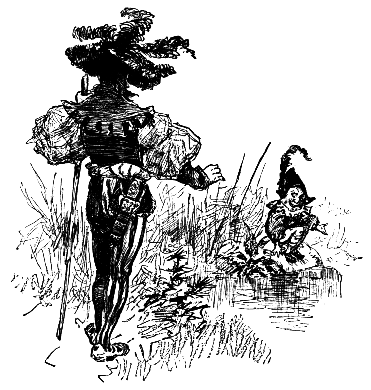 THE PERSISTENT KOBOLD OF KÖPENICK.
THE PERSISTENT KOBOLD OF KÖPENICK.
Near Köpenick once, a man thought of buying a new house, and turning his back on a vexatious Kobold. The morning before he meant to change quarters, he saw his Kobold sitting by a pool, and asked him what he was doing. "I am doing my washing!" said the sharp rogue, "because we[94] move to-morrow." And the man saw very well that as he could not avoid him, he had better take the little nuisance along. The same thing happened in the capital Polish anecdote of Iskrzycki (make your respects to his excruciating name!) and over Northern Europe the sarcastic joke "Yes, we're flitting!" prevails in folk-song and story.
There is many and many an example of families selling the old house, and going off in great glee with the furniture, thinking the elf-rascal cheated and left behind; and lo! there he was, perched on a rope, or peering from a hole in the cart itself, on his congratulated master.
The funniest hap of all befell an ungrateful farmer who fired his barn to burn the poor Kobold in it. As he was driving off, he turned to look at the blaze, and what should he see on the seat behind him but the same excited Kobold, chattering, monkey-like, and shrieking sympathizingly: "It was about time for us to get out of that, wasn't it?"
The dark-skinned little house-sprites came to stay; and as for being snubbed, they were quite[95] above it. They were the sort of callers to whom you could never show the door, with any dignity; for if you had done so, the grinning goblin would have examined knob and panels with a squinted eye, and gone back whistling to your easy-chair.
The Swedish pair offered presents to those on shore, or passing in boats, in hopes to sink them beneath the waves.
England and Ireland had no water-sprites which answered to the Nix and the Kelpie, only the Merrow, who was a Mermaid. She was a fair woman, with white, webbed fingers. She carried upon her head a little diving-cap, and when she came up to the rocks or the beach, she laid it by; but if it were stolen from her, she lost the power of returning to the sea. So that if her cap were taken by a young man, she very often could do nothing better than to marry him, and spend her time hunting for it up and down over his house. And once she had found it, she forgot all else but her desire to go home to "the kind sea-caves," and despite the calling of her neighbors and husband and children, she flitted to the shore, and plunged into the first oncoming billow, and walked the earth no longer.
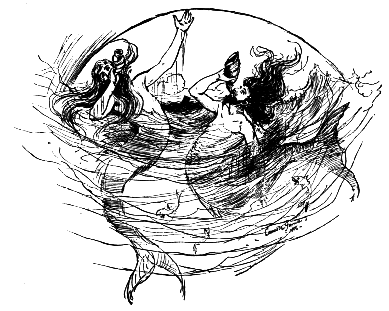 MER-FOLK.
MER-FOLK.
Tales of these spirit-brides who suddenly deserted[98] the green earth for their dear native waters, are common in Arabian and European folk-lore. And this characteristic was noted also in the Sea-trows of the Shetland Islands, who divested themselves of a shining fish-skin, and could not find the way to their ocean-beds if it were kept out of their reach. It was the Danish sailor's belief that seals laid by their skins every ninth night, and took maiden's forms wherewith to sport and sleep on the reefs. And for their capture as they were, warm,[99] living and human, one had only to snatch and hide away their talisman-skin.
The strange German Water-man wore a green hat, and when he opened his mouth, his teeth as well were green; he appeared to girls who passed his lake, and measured out ribbon, and flung it to them.
But we must search for smaller sprites than these.
The little water-fairies who devoted themselves to drawing under whomsoever encroached on their pools and brooks, were called Nixies in Germany, Korrigans (for this was part of their office) in Brittainy; Ondins about Magdebourg, and Roussalkis, the long-haired, smiling ones, among the Slavic people.
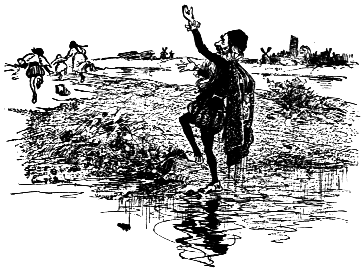 THE LITTLE OLD NIX NEAR GHENT.
THE LITTLE OLD NIX NEAR GHENT.
The engaging Nixies were very minute and mischievous, and abounded in the Shetland Isles and Cornwall, as did, moreover, the Kelpies, who were like tiny horses, known even in China; sporting on the margin, and foreboding death by drowning, to any who beheld them; or tempting passers-by to mount, and plunging, with their victims, headlong[100] into the deep. The Nix-lady was recognized when she came on shore by the edges of her dress or apron being perpetually wet. The dark-eyed Nix-man with his seaweed hair and his wide hat, was known by his slit ears and feet, which he was very careful to conceal. Once in a while he was observed to be half-fish. The naked Nixen were draped with moss and kelp; but when they were clothed, they seemed merely little men and women, save that the borders of their garments, dripping water, betrayed them. They did their marketing ashore, wheresoever they were, and, according to[101] all accounts, with a sharp eye to economy. Like the land-elves, they loved to dance and sing. Nix did not favor divers, fishermen, and other intruders on his territory, and he did his best to harm them. He was altogether a fierce, grudging, covetous little creature. His comelier wife was much better-natured, and befriended human beings to the utmost of her power.
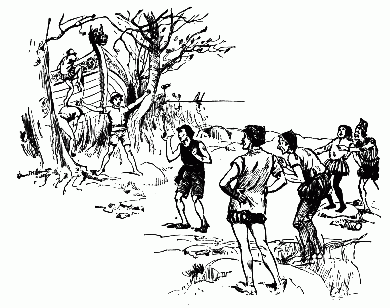 THE WORK OF THE NICKEL.
THE WORK OF THE NICKEL.
Near Ghent was a little old Nix who lived in the Scheldt; he cried and sighed much, and did mischief to no one. It grieved him when children ran away from him, yet if they asked what troubled his conscience, he only sighed heavily, and disappeared.
The modern Greeks believed in a black sprite haunting wells and springs, who was fond of beckoning to strangers. If they came to him, he bestowed gifts upon them; if not, he never seemed angry, but turned patiently to wait for the next passer-by.
There was a curious sea-creature in Norway, who swam about as a thin little old man with no head. About the magical Isle of Rügen lived the Nickel. His favorite game was to astonish the fishers, by hauling their boats up among the trees.
At Arles and other towns near the Spanish border in France, were the Dracs, who inhabited clear pools and streams, and floated along in the shape of gold rings and cups, so that women and children bathing should grasp them, and be lured under.
The Indian water-manittos, the Nibanaba, were winning in appearance, and wicked in disposition. They, joining the Pukwudjinies, helped to kill Kwasind.
In Wales were the Gwragedd Annwn, elves who loved the stillness of lonely mountain-lakes, and[103] who seldom ventured into the upper world. They had their own submerged towns and battlements; and from their little sunken city the fairy-bells sent out, ever and anon, muffled silver voices. The Gwragedd Annwn were not fishy-finned, nor were they ever dwellers in the sea; for in Wales were no mermaid-traditions, nor any tales of those who beguiled mortals—
The Neck and the Strömkarl of Swedish rivers were two little chaps with hardly a hair's breadth of difference. Either appeared under various shapes; now as a green-hatted old man with a long beard, out of which he wrung water as he sat on the cliffs; now loitering of a summer night on the surface, like a chip of wood or a leaf, he seemed a fair child, harping, with yellow ringlets falling from beneath a high red cap to his shoulders. Both fairies had a genius for music; and the Strömkarl, especially, had one most marvellous tune to which he put eleven variations. Now, to ten of them any one might dance decorously, and with safety; but[104] at the eleventh, which was the enchanted one, all the world went mad; and tables, belfries, benches, houses, windmills, trees, horses, cripples, babies, ghosts, and whole towns full of sedate citizens began capering on the banks about the invisible player, and kept it up in furious fashion until the last note died away.
You know that the wren was hunted in certain countries on a certain day. Well, here is one legend about her. There was a malicious fairy once in the Isle of Man, very winsome to look at, who worked a sorry Kelpie-trick, on the young men of the town, and inveigled them into the sea, where they perished. At last the inhabitants rose in vengeance, and suspecting her of causing their loss and sorrow, gave her chase so hard and fast by land, that to save herself, she changed her shape into that of an innocent brown wren. And because she had been so treacherous, a spell was cast upon her, inasmuch as she was obliged every New Year's Day to fly about as that same bird, until she should be killed by a human hand. And from sunrise to sunset, therefore, on the first bleak day of January,[105] all the men and boys of the island fired at the poor wrens, and stoned them, and entrapped them, in the hope of reaching the one guilty fairy among them. And as they could never be sure that they had captured the right one, they kept on year by year, chasing and persecuting the whole flock. But every dead wren's feather they preserved carefully, and believed that it hindered them from drowning and shipwreck for that twelvemonth; and they took the feathers with them on voyages great and small, in order that the bad fairy's magic may never be able to prevail, as it had prevailed of yore with their unhappy brothers.
The presence of the sea-fairies had a terror in it, and against their arts only the strongest and most watchful could hope to be victorious. Their sport was to desolate peaceful homes, and bring destruction on gallant ships. They, dwelling in streams and in the ocean, the world over, were like the waters they loved: gracious and noble in aspect, and meaning danger and death to the unwary. We fear that, like the earth-fairies, they were heartless quite.
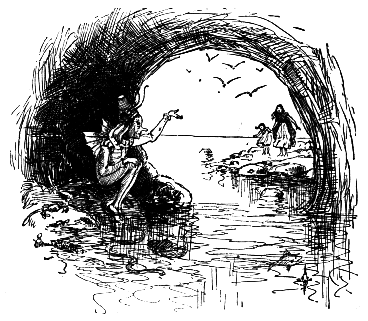 HOB IN HOBHOLE
HOB IN HOBHOLE
But it may be that the gentle Nixies had only a blind longing for human society, and would not willingly have wrought harm to the creatures of another element. We are more willing to urge excuses for their wrong-doing than for the like fault in our frowzly under-ground folk; for ugliness seems, somehow, not so shocking when allied with evil as does beauty, which was destined for all men's delight and uplifting. As the air-elves had their Fairyland whither mortal children wandered, and whence they returned after an unmeasured[107] lapse of time, still children, to the ivy-grown ruins of their homes, so the water-elves had a reward for those they snatched from earth; and legends assure us the wave-rocked prisoners a hundred fathoms down, never grew old, but kept the flush of their last morning rosy ever on their brows.
Among a little community full of guile, there is great comfort in spotting one honest, kind water-boy, who, not content with being harmless, as were the Flemish and Grecian Nixies, put himself to work to do good, and charm away some of the worries and ills that burdened the upper world. His name was Hob, and he lived in Hobhole, which was a cave scooped out by the beating tides in old Northumbria.
The lean pockets of the neighboring doctors were partly attributed to this benignant little person; for he set up an opposition, and his specialty was the cure of whooping-cough. Many a Scotch mother took her lad or lass to the spray-covered mouth of the wise goblin's cave, and sang in a low voice:
And so he did, sitting there with his toes in the sea. For Hobhole Hob's small sake, we can afford to part friends with the whole naughty race of water-folk.
Very often quarrelsome, disobedient or vicious[110] folk fell into the snare of a Kelpie, or a Will-o'-the-Wisp; for the little whipper-snappers had a fine eye for poetical justice, and dealt out punishments with the nicest discrimination. We never hear that they troubled good, steady mortals; but only that sometimes they beguiled them, for sheer love, into Fairyland.
We know that all "ouphes and elves" could change their shapes at will; therefore when we spy fairy-horses, fairy-lambs, and such quadrupeds, we guess at once that they are only roguish small gentlemen masquerading. Never for the innocent fun of it, either; but alas! to bring silly persons to grief.
In Hampshire, in England, was a spirit known as Coltpixy, which, itself shaped like a miniature neighing horse, beguiled other horses into bogs and morasses. The Irish Pooka or Phooka was a horse too, and a famous rascal. He lived on land, and was something like the Welsh Gwyll: a tiny, black, wicked-faced wild colt, with chains dangling about him. Again, he frisked around in the shape of a goat or a bat. Spenser has him:
"Fray," as you are likely to guess, means to frighten or to scare.
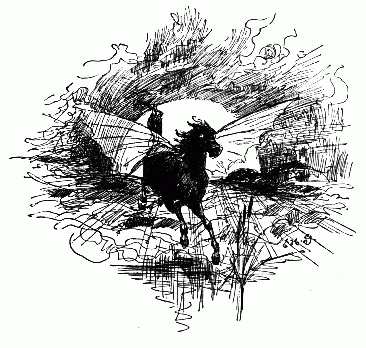 THE IRISH POOKA WAS A HORSE TOO.
THE IRISH POOKA WAS A HORSE TOO.
Kelpies, who were Scotch, haunted fords and ferries, especially in storms; allured bystanders into the water, or swelled the river so that it broke the roads, and overwhelmed travellers.
Very like them were the Brag, the little Shoopil-tree[112] of the Shetland Islands, and the Nick, who was the Icelandic Nykkur-horse; gamesome deceivers all, who enticed children and others to bestride them, and who were treacherous as a quicksand, every time. And there were many more of the Kelpie kingdom, of whom we can hunt up no clews.
A man who saw a Kelpie gave himself up for lost; for he was sure, by hook or crook, to meet his death by drowning. Kelpie, familiar so far away as China, never stayed in the next-door countries, Ireland or England, long enough to be recognized. They knew nothing of him by sight, nor of the Nix his cousin, nor of anything resembling them. In Ireland lived the merrow; but she was only an amiable mermaid.
The Japanese had a water-dragon called Kappa, "whose office it was to swallow bad boys who went to swim in disobedience to their parents' commands, and at improper times and places." In the River Tees was a green-haired lady named Peg Powler, and in some streams in Lancashire one christened Jenny Greenteeth; two hungry goblins whose only delight was to drown and devour unlucky travellers. But we know already that the water-sprites were more than likely so to behave.
In Provence there is a tale told of seven little boys who went out at night against their grandmother's wishes. A little dark pony came prancing up to them, and the youngest clambered on his sleek back, and after him, the whole seven, one after the other, which was quite a wonderful weight for the wee creature; but his back meanwhile kept growing longer and larger to accommodate them. As they galloped along, the children called such of their playmates as were out of doors, to join them, the obliging nag stretching and stretching until thirty pairs of young legs dangled at his sides! when he made straight for the sea, and plunged in, and drowned them all.
The Piskies, or Pigseys, of Cornwall, were
naughty and unsociable. Their great trick was
to entice people into marshes, by making themselves
look like a light held in a man's hand, or
a light in a friendly cottage window. Pisky also[115]
[116]
rode the farmers' colts hard, and chased the farmers'
cows. For all his diabolics, you had to excuse
him in part, when you heard his hearty fearless
laugh; it was so merry and sweet. "To laugh like
a Pisky," passed into a proverb. The Barguest
of Yorkshire, like the Osschaert of the Netherlands,
was an open-air bugaboo whose presence
always portended disaster. Sometimes he appeared
as a horse or dog, merely to play the old
trick with a false light, and to vanish, laughing.
The Tückebold was a very malicious chap, carrying a candle, who lived in Hanover; his blood-relation in Scandinavia was the Lyktgubhe. Over in Flanders and Brabant was one Kludde, a fellow whisking here and there as a half-starved little mare, or a cat, or a frog, or a bat; but who was always accompanied by two dancing blue flames, and who could overtake any one as swiftly as a snake. The Ellydan (dan is a Welsh word meaning fire, and also a lure or a snare: a luring elf-fire) was a rogue with wings, wide ears, a tall cap and two huge torches, who precisely resembled the English Will-o'-the-Wisp, the Scandinavian[117] Lyktgubhe and the Breton Sand Yan y Tad. Our American negroes make him out Jack-muh-Lantern: a vast, hairy, goggle-eyed, big-mouthed ogre, leaping like a giant grasshopper, and forcing his victims into a swamp, where they died. The gentlemen of this tribe preferred to walk abroad at night, like any other torchlight procession. Their little bodies were invisible, and the traveller who hurried towards the pleasant lamp ahead, never knew that he was being tricked by a grinning fairy, until he stumbled on the brink of a precipice, or found himself knee-deep in a bog. Then the brazen little guide shouted outright with glee, put out his mysterious flame, and somersaulted off, leaving the poor tourist to help himself. The only way to escape his arts was to turn your coat inside out.
You may guess that the ungodly wights had plenty of fun in them, by this anecdote: A great many Scotch Jack-o'-Lanterns, as they are often called, were once bothering the horse belonging to a clergyman, who with his servant, was returning home late at night. The horse reared and whinnied,[118] and the clergyman was alarmed, for a thousand impish fires were waltzing before the wheels. Like a good man, he began to pray aloud, to no avail. But the servant just roared: "Wull ye be aff noo, in the deil's name!" and sure enough, in a wink, there was not a goblin within gunshot.
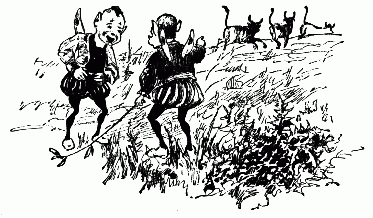 PISKY ALSO CHASED THE FARMERS' COWS.
PISKY ALSO CHASED THE FARMERS' COWS.
There were some freakish fairies in old England, whose names were Puckerel, Hob Howland, Bygorn, Bogleboe, Rawhead or Bloodybones; the last two were certainly scarers of nurseries.
The Boggart was a little spectre who haunted farms and houses, like Brownie or Nis; but he was usually a sorry busybody, tearing the bed-curtains,[119] rattling the doors, whistling through the keyholes, snatching his bread-and-butter from the baby, playing pranks upon the servants, and doing all manner of mischief.
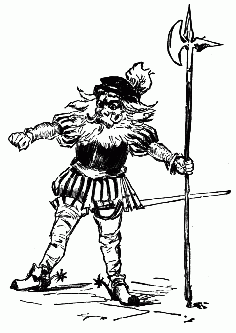 RED COMB WAS A TYRANT.
RED COMB WAS A TYRANT.
The Dunnie, in Northumberland, was fond of annoying farmers. When night came, he gave them and himself a rest, and hung his long legs over the crags, whistling and banging his idle heels. Red Comb or Bloody Cap was a tyrant who lived in every Border castle, dungeon and tower. He was short and thickset long-toothed and skinny-fingered, with big red eyes, grisly flowing hair, and iron boots; a pikestaff in his left hand, and a red cap on his ugly head.
The village of Hedley, near Ebchester, in England, was haunted by a churlish imp known far and wide as the Hedley Gow. He took the form of a cow, and amused himself at milking-time with kicking over the pails, scaring the maids, and calling the cats, of whom he was fond, to lick up the cream. Then he slipped the ropes and vanished, with a great laugh. In Northern Germany we find the Hedley Gow's next-of-kin, and there, too, were little underground beings who accompanied maids and men to the milking, and drank up what was spilt; but if nothing happened to be spilt in measuring out the quarts, they got angry, overturned the pails, and ran away. These jackanapes were a foot and a half high, and dressed in black, with red caps.
Many ominous fairies, such as the Banshee, portended misfortune and death. The Banshee had a high shrill voice, and long hair. Once in a while she seemed to be as tall as an ordinary woman, very thin, with head uncovered, and a floating white cloak, wringing her hands and wailing. She attached herself only to certain ancient[121] Irish families, and cried under their windows when one of their race was sick, and doomed to die. But she scorned families who had a dash of Saxon and Norman ancestry, and would have nothing to do with them.
Every single fairy that ever was known to the annals of this world was, at times, a mischief-maker. He could no more keep out of mischief than a trout out of water. What lives the dandiprats led our poor great-great-great-great grand-sires! As a very clever living writer put it:
"A man could not ride out without risking an encounter with a Puck or a Will-o'-the Wisp. He could not approach a stream in safety unless he closed his ears to the sirens' songs, and his eyes to the fair form of the mermaid. In the hillside were the dwarfs, in the forest Queen Mab and her court. Brownie ruled over him in his house, and Robin Goodfellow in his walks and wanderings. From the moment a Christian came into the world until his departure therefrom, he was at the mercy of the fairy-folk, and his devices to elude them were many. Unhappy was the mother who neglected to lay a pair of scissors or of tongs, a knife or her husband's breeches, in the cradle of her new-born infant; for if she forgot, then was she sure to receive a changeling in its place. Great was the loss of the child to whose baptism the fairies were not invited, or the bride to whose wedding[122] the Nix, or water-spirit, was not bidden. If the inhabitants of Thale did not throw a black cock annually into the Bode, one of them was claimed as his lawful victim by the Nickelmann dwelling in that stream. The Russian peasant who failed to present the Rusalka or water-sprite he met at Whitsuntide, with a handkerchief, or a piece torn from his or her clothing, was doomed to death."
One had to be ever on the lookout to escape the sharp little immortals, whose very kindness to men and women was a species of coquetry, and who never spared their friends' feelings at the expense of their own saucy delight.
The very old word Pouke meant the devil, horns, tail, and all; from that word, as it grew more human and serviceable, came the Pixy of Devonshire, the Irish Phooka, the Scottish Bogle, and the Boggart in Yorkshire; and even one nursery-tale title of Bugaboo. Oddest of all, the name Pug, which we give now to an amusing race of small dogs, is an every-day reminder of poor lost Puck, and of the queer changes which, through a century or two, may befall a word. Puck was considered court-jester, a mild, comic, playful creature:
Shakespeare, who calls him a "merry wanderer of the night," and allows him to fly "swifter than arrow from the Tartar's bow," was the first to make Puck into a house spirit. The poets were especially attentive to the offices of these house-spirits.
According to them, Mab and Puck do everything in-doors which we think characteristic of a Brownie. William Browne, born in Tavistock, in the county of Devon, where the Pixies lived, prettily puts it how the fairy-queen did[126]—
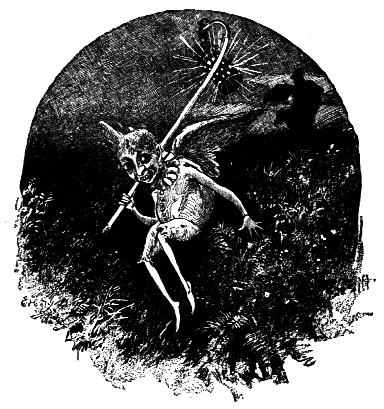 THE WELSH PUCK.
THE WELSH PUCK.
Herrick confirms what we have just heard:
John Lyly, in his very beautiful Mayde's Metamorphosis has this charming fairy song, which takes us out to the grass, and the soft night air, and the softer starshine:
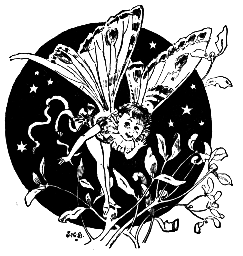 A MERRY NIGHT-WANDERER.
A MERRY NIGHT-WANDERER.
What a picture of the wee tribe at their revels! Here is another, from Ben Jonson's Sad Shepherd:
In what is thought to be Lyly's play, just mentioned, Mopso, Joculo, and Prisio have something in the way of a pun for each fairy they address:
(Mr. Keightley says that the Crickets were a family of great note in Fairyland: many poets celebrated them.)
Drayton, again, gives us a list of tinkling elfin-ladies' names, which are pleasant to hear as the drip of an icicle:
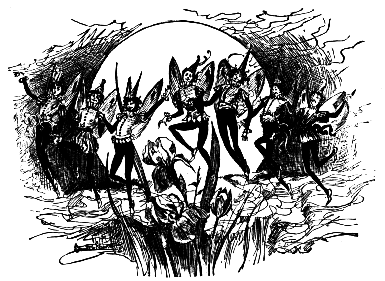 "BY THE MOON WE SPORT AND PLAY."
"BY THE MOON WE SPORT AND PLAY."
Young Randolph has an equally delightful account in the pastoral drama of Amyntas, of his wee folk orchard-robbing; whose chorused Latin Leigh Hunt thus translates, roguishly enough:
You will notice that Shakespeare places his Gothic goblins in the woods about Athens, a place where real fairies never set their rose-leaf feet, but where once sported yet lovelier Dryads and Naiads. These dainty British Greeks are very small indeed: Titania orders them to make war on the rear-mice, and make coats of their leathern wings. Mercutio's Queen Mab is scarce bigger than a snowflake. Prospero, in The Tempest, commands, besides his "delicate Ariel," all
The make-believe fairies in The Merry Wives know how to pinch offenders black and blue. The shepherd, in the Winter's Tale, takes the baby Perdita for a changeling. So that all the Shakespeare people seem wise in goblin-lore.
You see that we have looked for the literature of our pretty friends only among the old poets, and only English poets at that; but the foreign fairies are no less charming. Chaucer and Spenser loved the brood especially. Robert Herrick knew all about
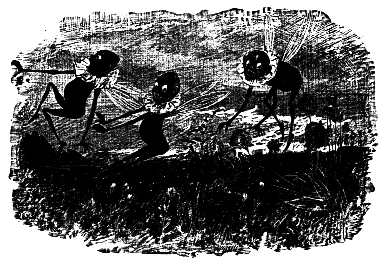 THE ELVES WHOSE LITTLE EYES GLOW.
THE ELVES WHOSE LITTLE EYES GLOW.
A tradition older and wider than the Tylwyth Teg's runs that a yearly tribute was due from Fairyland to the prince of the infernal regions, as poor King Ægeus had once to pay Minos of Crete with the seven fair boys and girls; and that, for the sake of sparing their own dear ones, the little beings, in their fantastic dress, flew east and west on an anxious hunt for human children, who might be captured and delivered over to bondage instead. And they crept cautiously to many a cradle, and having secured the sleeping innocent, "plucked the nodding nurse by the nose," as Ben Jonson said, and vanished with a scream of triumphant laughter. Welsh fairies have been caught in the very act of the theft, and a pretty[135] fight they made, every time, to keep their booty; but the strength of a man or a woman, was, of course, too much for them to resist long.
Now, whenever a mother, who, you may count upon it, thought her own urchin most beautiful of all under the moon, found him growing cross and homely, in despite of herself, she suddenly awoke to this view of the case: that the dwindled babe was her babe no longer, but a miserable young gosling from Fairyland slipped into its place. A miserable young foreign gosling it was from that hour, though it had her own grandfather's special kind of a nose on its unmistakable face.
The discovery always made a great sensation; people came from the surrounding villages to wonder at the lean, gaping, knowing-eyed small stranger in the crib, and to propose all sorts of charms which should rid the house of his presence, and restore the rightful heir again. They were not especially polite to the poor changeling. In Denmark, and in Ireland as well, they dandled him on a hot shovel! If he were really a changeling, the fairies, rather than see him singed, were[136] sure to appear in a violent fluster and whisk him away, and at the same minute to drop its former owner plump into the cradle. And if it were not a changeling, how did those queer by-gone mammas know when to stop the broiling and baking?
Mr. George Waldron, who in 1726 wrote an entertaining Description of the Isle of Man, recorded it that he once went to see a baby supposed to be a changeling; that it seemed to be four or five years old, but smaller than an infant of six months, pale, and silky-haired, and (what was unusual) with the fairest face under heaven; that it was not able to walk nor to move a joint, seldom smiled, ate scarcely anything, and never spoke nor cried; but that if you called it a fairy-elf, it fixed its gaze on you as if it would look you through. If it were left alone, it was overheard laughing and frolicking, and when it was taken up after, limp as cloth, its hair was found prettily combed, and there were signs that it had been washed and dressed by its unseen playfellows.
The main point to put the family mind at rest[137] on the matter, was to make the changeling "own up," force him to do something which no tender mortal in socks and bibs ever was able to do, such as dance, prophesy, or manage a musical instrument. There was an Irish changeling, the youngest of five sons, who, being teased, snatched a bagpipe from a visitor, and played upon it in the most accomplished and melting manner, sitting up in his wooden chair, his big goggle-eyes fixed on the company. And when he knew he was found out, he sprang, bagpipe and all, into the river; which leads one to suspect that he was a sort of stray Strömkarl.
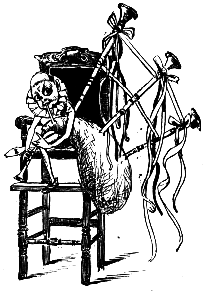 THERE WAS AN IRISH CHANGELING.
THERE WAS AN IRISH CHANGELING.
The Welsh fairies had good taste, and admired wholesome and handsome children. They stole such often, and left for substitute the plentyn-newid[138] (the change-child) who at first was exactly like the absent nursling, but soon grew ugly, shrivelled, biting, wailing, cunning and ill-tempered. In the hope of proving whether it were a fairy-waif or not, people put the little creature to such hard tests, that sometimes it nearly died of acquaintance with a rod, or an oven, or a well.
If the bereaved parent did some very astonishing thing in plain view of the wonder-chick, that would generally entrap it into betraying its secrets. A French changeling was once moved unawares to sing out that it was nine hundred years old, at least! In Wales, and also in Brittainy (which are sister-countries of one race) the following story is current: A mother whose infant had been spirited away, and who was much perplexed over what she took to be a changeling, was advised to cook a meal for ten farm-servants in one egg-shell. When the queer little creature, burning with curiosity, asked her from his high-chair what she was about, she could hardly answer, so excited was she to hear him speak. At that he cried louder: "A meal for ten, dear mother, in one egg-shell? The acorn before the oak have I seen, and the wilderness before the lawn, but never did I behold anything like that!" and so gave damaging evidence of his age and his unlucky wisdom. And the woman replied: "You have seen altogether too much, my son, and you shall have a beating!" And thereupon she began to thrash him, until he screeched, and a fairy appeared hurriedly to rescue him, and in the crib lay the round, rosy, real child, who had been missing a long while.
Now the "gentry" of modern Greece had an eye also to clever children; but they almost always brought them back, laden with gifts, lovelier in person than when they were taken from home. And if they appointed a changeling in the meantime (which they were not very apt to do) it never showed its elfin nature until it was quite grown up! unlike the uncanny goblins who were all too ready from the first to give autobiographies on the slightest hint.
The Drows of the Orkney Islands fancied larger
game. They used to stalk in among church congregations
and carry off pious deacons and deaconesses![141]
[142]
So wrote one Lucas Jacobson Debes, in
1670.
In a pretty Scotch tale, a sly fairy threatened to steal the "lad bairn," unless the mother could tell the fairy's right name. The latter was a complete stranger, and the woman was sore worried; and went to walk in the woods to ease her anxious and aching heart, and to think over some means of outwitting the enemy of her boy. And presently she heard a faint voice singing under a leaf:
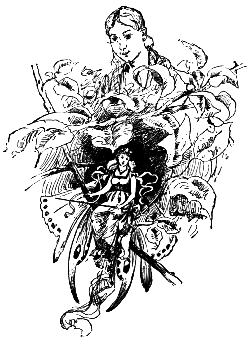 SHE HEARD A FAINT VOICE SINGING UNDER A LEAF.
SHE HEARD A FAINT VOICE SINGING UNDER A LEAF.
Fairy-folk young and old were coquettish enough[143] about their names, and greatly preferred they should not be spoken outright. This habit got them into many a scrape. The anecdote of "Who hurt you? Myself!" was told in Spain, Finland, Brittainy, Japan, and a dozen other kingdoms, and seems to be as old as the Odyssey. Do you remember where Ulysses tells the Cyclop that his name is Outis, which means Nobody? and how, after the eye of the wicked Polyphemus has been[144] put out, the comrades of the big blinded fellow ask him who did the deed, and he growls back, very sensibly: "Nobody!" Consider what follows a typical modern version of the same trick.
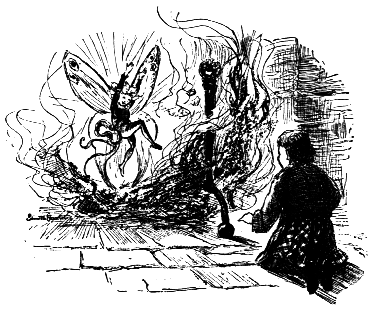 "AINSEL."
"AINSEL."
A young Scotch child, whom we will call Alan, sits by the fire, when a pretty creature the size of a doll, waltzes down the chimney to the hearth, and begins to frolic. When asked its name it says shrewdly: "Ainsel"; which to the boy sounds like what it really is, "Ownself," and makes him,[145] when it is his turn to be questioned, as saucy and reticent as he supposes his elfin playfellow to be. So Alan tells the sprite that his name is "My Ainsel," and gets the better of it. For bye-and-bye they wax very frisky and friendly, and right in the middle of their sport, when little Alan pokes the fire, and gets a spark by chance on Ainsel's foot, and when he roars with pain, and the old fairy-mother appears instantly, crying angrily: "Who has hurt thee? Who has hurt thee?" the elf blurts, of course, "My Ainsel!" and she kicks him unceremoniously up chimney, and bids him stop whimpering, since the burn was of his own silly doing! Alan, meanwhile, climbs upstairs to bed, rejoicing to escape the vengeance of the fairy-mother, and chuckling in his sleeve at the funny turn things have taken.
Gitto Bach (little Griffith) was a Welsh farmer's boy, who looked after sheep on the mountain-top. When he came home at evenfall he often showed his brothers and sisters bits of paper stamped like money. Now when it was given to him, it was real money; but the fairy-gifts would not bear handling, and turned useless and limp as soon as Gitto showed them. One day he did not return. After two years his mother found him one morning at the door, smiling, and with a bundle under his arm. She asked him, with many tears, where he had been so long, while they had mourned for him as dead. "It is only yesterday I went away!" said Gitto. "See the pretty clothes the mountain-children[148] gave me, for dancing with them to the music of their harps." And he opened his bundle, and showed a beautiful dress: but his mother saw it was only paper, after all, like the fairy money.
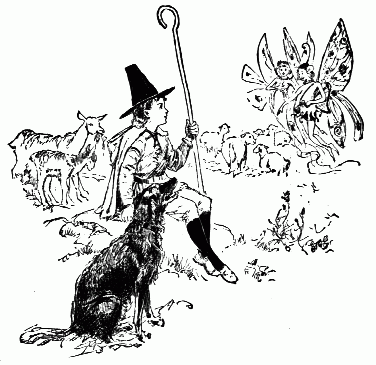 GITTO BACH AND THE FAIRIES.
GITTO BACH AND THE FAIRIES.
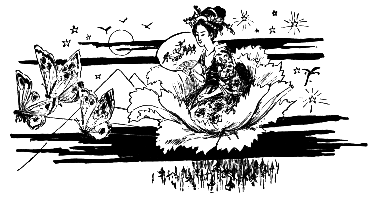 KAGUYAHIME, THE MOON-MAID.
KAGUYAHIME, THE MOON-MAID.
Our pretty friends enjoyed beguiling mortals into their shining underworld, with song, and caresses, and winning promises. Once the mortal entered, he met with warm welcomes from all, and the most exquisite meat and drink were set before him.[149] Now, if he had but the courage to refuse it, he soon found himself back on earth, whence he was stolen. But if he yielded to temptation, and his tongue tasted fairy food, he could never behold his native hills again for years and years. And when, after that exquisite imprisonment, he should be torn from his delights and set back at his father's door, he should find his memory almost forgotten, and others sitting with a claim in his empty seat. And he should not remember how long he had been missing, but grow silent and depressed, and sit for hours, with dreamy eyes, on lonely slopes and wildwood bridges, not desiring fellowship of any soul alive; but with a heartache always for his[150] little lost playfellows, and for that bright country far away, until he died.
Often the creature who has once stood in the courts of Fairyland, is placed under vow, when released, and allowed to visit the earth, to come back at call, and abide there always. For the spell of that place is so strong, no heart can escape it, nor wish to escape it. Thus ends the old romance of Thomas the Rhymer: that, at the end of seven years, he was freed from Fairyland, made wise beyond all men; but he was sworn to return whenever the summons should reach him. And once as he was making merry with his chosen comrades, a hart and a hind moved slowly along the village street; and he knew the sign, laid down his glass, and smiled farewell; and followed them straightway into the strange wood, never to be seen more by mortal eyes.
A wonderful and beautiful Japanese story, too, the ancient Taketori Monogatari, written in the first half of the tenth century, tells us how a grey-haired bamboo-gatherer found in a bamboo-blade a radiant elf-baby, and kindly took it home to his[151] wife; and because of their great and ready generosity to the waif, the gods made them thrive in purse and health; and how, when the little one had been with them three months, Kaguyahime, for that was she, grew suddenly to a tall and fair girl, and so remained unchanging, for twenty years, while five gallant Japanese lords were doing her strange commands, and running risks the world over. Then, though the emperor, also, was her suitor, and though she was unspeakably fond of her old foster-parents, and grieved to go from them, she, being a moon-maid, went back in her chariot one glorious night to her shining home, whence she had been banished for some old fault, and whither the love and longing and homage of all the land pursued her.
Many sweet wild Welsh and Cornish legends deal with shepherds and yeomen who set foot on a fairy mound by chance, or who, in some other fashion, were transplanted to the realm of the dancing, feasting elves. But they have a pathetic ending, since no wanderer ever strayed back with all his old wits sound and sharp. He seemed as[152] one who walked in sleep, and had no care or recognition for the faces that once he held dear. And if he were roused too rudely from his long reverie, he died of the shock.
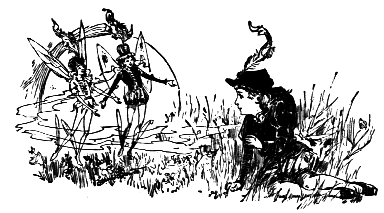 THE LITTLE HUNCHBACK.
THE LITTLE HUNCHBACK.
A merrier tale, and one which is very wise and pretty as well, is current in many literatures. The Irish version runs somewhat in this fashion, and the Spanish and Breton versions are extraordinarily like it. A little hunchback resting at nightfall in an enchanted neighborhood, heard the fairies, from their borderlands near by, singing over and over the names of the days of the week. "And Sunday, and Monday, and Tuesday!" they chorus: "and Sunday and Monday and Tuesday."[153] The boy thinks it rather hard that they do not know enough to finish their musical chant with the names of the remaining days; so, when they pause a little, very softly, and tunefully, he adds: "And Wednesday"! The wee folk are delighted, and make their chant longer by one strophe; and they crowd out in their finery from the mound, bearing the stranger far down into its depths where there are the glorious open halls of Fairyland: kissing and praising their friend, and bringing him the daintiest fruit lips ever tasted; and to reward him lastingly, their soft little hands lift the cruel hump from his back, and he runs dancing home, at a year's end, to acquaint the village with his happy fortune. Now another deformed lad, his neighbor, is racked with jealousy at the sight of his former friend made straight and fair; and he rushes to the fairy-mound, and sits, scowling, waiting to hear them begin the magic song. Presently rise the silver voices: "And Sunday, and Monday, and Tuesday, and Wednesday, and Sunday and Monday and Tuesday and Wednesday": whereat the audience breaks in rudely, right in the middle[154] of a cadence: "And Friday." Then the gentle elves were wrathful, and swarmed out upon him, snarling and striking at him in scorn; and before he escaped them, they had fastened on his crooked back beside his own, the very hump that had belonged to the first comer! In the anecdote, as it is given in Picardy, the justice-dealing goblins are described as very small and comely, clad in violet-colored velvet, and wearing hats laden with peacock plumes. In the Japanese rendering, a wen takes the place of the hump.
Fairyland is the home of every goblin, bright or fierce, that ever we heard of; the home, too, of the ogres and dragons, and enchanted princesses, and demons, and Jack-the-giant-killers of all time. The Brownies belonged there, and went thither in their worldly finery, when service was over; the gnomes and snarling mine-sprites, the sweet dancing elves, the fairies who stole children, or romped under the river's current, or plagued honest farmers, or tiptoed it with a torch down a lonesome road—every one there had his country and his fireside.
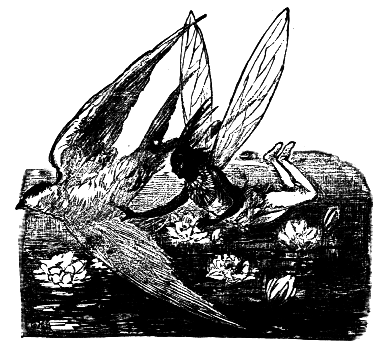 TAKNAKANX KAN.
TAKNAKANX KAN.
In that merry company were many who have escaped us, and who sit in a blossomy corner by themselves, the oddest of the odd: like the Japanese Tengus, who have little wings and feathers, like birds, until they grew up; mouths very seldom opened, and most amazing big noses, with which, on earth, they were wont to fence, to whitewash, to write poetry, and to ring bells! There, too, were the dark-skinned Indian wonder-babies: Weeng, whom Mr. Longfellow celebrates as Nepahwin, the Indian god of sleep, with his numerous train of little fairy men armed with clubs; who at nightfall sought out mortals, and with innumerable light blows upon their foreheads, compelled them to slumber. The great boaster, Iagoo, whom Hiawatha knew, once declared that he had seen King Weeng himself, resting against a tree, with many waving and music-making wings on his back. Indian, likewise, was the spirit named Canotidan, who dwelt in many a hollow tree; and the lively fellow, Taknakanx Kan, who sported "in the nodding flowers; who flew with the birds, frisked with the squirrels, and skipped with the grasshopper;[156] who was merry with the gay running brooks, and shouted with the waterfall; who moved with the sailing cloud, and came forth with the dawn." He never slept, and never had time to sleep, being the god of perpetual motion. Near him, perhaps, see-sawed a couple of long-eyed Chinese San Sao, or the glossy-haired Fées of Southern France pelted one another with dew-drops. There also, the African Yumboes had their magnificent tents spread: those strange little thieving Banshee-Brownies,[157] wrapped in white cotton pangs, who leaned back in their seats after a gorgeous repast, and beheld an army of hands appear and carry off the golden dishes! There abided, as the venerated elder of the rest, the long-bearded Pygmies whom Homer, Aristotle and good Herodotus had not scorned to celebrate, whom Sir John Mandeville avowed to be "right fair and gentle, after their quantities, both the men and the women.... And he that liveth eight year, men hold him right passing old ... and of the men of our stature have they as great scorn and wonder as we would have among us of giants!"
Of these and thousands more marvellous is Fairyland full; full of things startling and splendid and grewsome and visionary:
Any picture of it is tame, any worded description dull and heavy, to you who discover it daily at first hand, and who know its faces and voices, which fade too quickly from the brain. All fine adventures[158] spring thence: all loveliest color, odor and companionship are in that stirring, sparkling world. Can you not help us back there for an hour? Who knows the path? Who can draw a map, and set up a sign-post? Who can bar the gate, when we are safe inside, and keep us forever and ever in our forsaken "dear sweet land of Once-upon-a-Time"?
We are sorry for her, and sorry with her. The Little People, alas! have gone away; would that they might return! No man knows why nor when they left us; nor whither they turned their faces. The exodus was made softly and slowly, till the whole bright tribe had stolen imperceptibly into exile. Mills, steam-engines and prowling disbelievers joined to banish them; their poetic and dreamy drama is over, their magic lamp out, and their jocund music hushed and forbidden. Or[160] perhaps they of themselves went lingeringly and sorrowfully afar, because the world had grown too rough for them.
Geoffrey Chaucer, in the fourteenth century, wrote in his sweet, tranquil fashion:
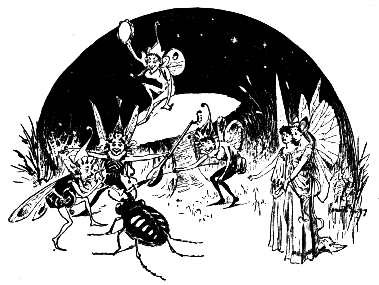 "AL WAS THIS LOND FULFILLED OF FAERIE."
"AL WAS THIS LOND FULFILLED OF FAERIE."
Sir Walter Scott related that the last Brownie[161] was the Brownie of Bodsbeck, who lived there long, and vanished, as is the wont of his clan, when the mistress of the house laid milk and a piece of money in his haunts. He was loath to go, and moaned all night: "Farewell to Bonnie Bodsbeck!" till his departure at break of day. A girl from Norfolk, England, questioned by Mr. Thomas Keightley, admitted that she had often seen the Frairies, dressed in white, coming up from their little cities underground! Mr. John Brand saw a man who said he had seen one that had seen fairies![162] And Mr. Robert Hunt, author of the Drolls and Traditions of Old Cornwall, wrote that forty years ago every rock and field in that country was peopled with them! and that "a gentleman well-known in the literary world of London very recently saw in Devonshire a troop of fairies! It was a breezy summer afternoon, and these beautiful little creatures were floating on circling zephyrs up the side of a sunlit hill, fantastically playing,
So here are three trustworthy gentlemen, makers of books on this special subject, and none of them very long dead, to offset Master Geoffrey Chaucer, and to bring the "lond fulfilled of faerie" closer than he dreamed. About the year 1865, a correspondent told Mr. Hunt the following queer little story:
"I heard last week of three fairies having been seen in Zennor very recently. A man who lived at the foot of Trendreen Hill in the valley of Treridge, I think, was cutting furze on the hill. Near[163] the middle of the day he saw one of the small people, not more than a foot long, stretched at full length and fast asleep, on a bank of heath, surrounded by high brakes of furze. The man took off his furze-cuff and slipped the little man into it without his waking up, went down to the house, and took the little fellow out of the cuff on the hearthstone, when he awoke, and seemed quite pleased and at home, beginning to play with the children, who were well pleased also with the small body, and called him Bobby Griglans. The old people were very careful not to let Bob out of the[164] house, nor be seen by the neighbors, as he had promised to show the man where crocks of gold were buried on the hill. A few days after he was brought, all the neighbors came with their horses, according to custom, to bring home the winter's reek of furze, which had to be brought down the hill in trusses on the backs of the horses. That Bob might be safe and out of sight, he and the children were shut up in the barn. Whilst the furze-carriers were in to dinner, the prisoners contrived to get out to have a run round the furze-reek, when they saw a little man and woman not much larger than Bob, searching into every hole and corner among the trusses that were dropped round the unfinished reek. The little woman was wringing her hands and crying 'O my dear and tender Skillywidden! wherever canst thou be gone to? Shall I ever cast eyes on thee again?' 'Go 'e back!' says Bob to the children; 'my father and mother are come here too.' He then cried out: 'Here I am, mammy!' By the time the words were out of his mouth, the little man and woman, with their precious Skillywidden, were nowhere to be seen,[165] and there has been no sight nor sign of them since. The children got a sound thrashing for letting Skillywidden escape."
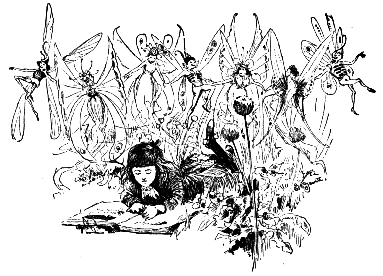 FAIRY STORIES.
FAIRY STORIES.
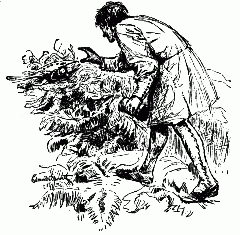 THE CAPTURE OF SKILLYWIDDEN.
THE CAPTURE OF SKILLYWIDDEN.
Such is the latest evidence we can find of the whereabouts of our goblins.
We may, however, consider ourselves their contemporaries, since among the peasantry of many countries over-seas, the belief is not yet extinct. But it is pretty clear to us, modern and American as we are (safer in so thinking than anybody was anywhere before!) that the "restless people," as the Scotch called them, are at rest, and clean quit of this world; and perhaps satisfied, at last, of their chance of salvation, along with fortunate Christians.
Such a great system as this of fairy-lore, propped on such show of earnestness, grew up, not of a[166] sudden like a mushroom after a July rain, but gradually and securely, like a coral-reef. And the dream-building was not nonsense at all, but a way of putting what was evident and marvellous into a familiar guise. If certain strange things, which are called phenomena, happened—things like the coming of pebbles from clouds, music from sand, sparkling light from decay, or disease and death from the mere handling of a velvety leaf—then our forefathers, instead of gazing straight into the eyes of the fact, as we are taught to do, looked askance, and made a fantastic rigmarole concerning the pebbles, or the music, and passed it down as religion and law.
The simple-minded citizens of old referred any trifling occurrence, pleasant or unpleasant, to the fairies. The demons and deities, according to their notion of fitness, governed in vaster matters; and the new, potent sprites took shape in the popular brain as the controllers of petty affairs. If a shepherd found one of his flock sick, it had been elf-shot; if a girl's wits went wool-gathering, it was a sign she had been in fairyland; if a cooing[167] baby turned peevish and thin, it was a changeling! Wherever you now see a mist, a cobweb, a moving shadow on the grass; wherever you hear a cricket-chirp, or the plash of a waterfall, or the cry of the bird on the wing, there of yore were the fairy-folk in their beauty. They stood in the mind to represent the lesser secrets of Nature, to account for some wonder heard and seen. It was many a century before nations stopped romancing about the brave things on land and sea, and began to speculate, to observe more keenly, to hunt out reasons, and to lift the haze of their own fancy from heroic facts and deeds.
Think a moment of the Danish moon-man, who breathed pestilence, and the moon-woman, whose harp was so charming. Well, the moon-man meant nothing else than the marsh, slimy and dangerous, which yielded a malarial odor; and the wee woman with her harp represented the musical night-wind, which played over the marsh rushes and reeds. Was it not so, too, with the larger myths of Greece? For the story of Proserpine, carried away by the god of the under world, and after[168] a weary while, given back for half-a-year to her fond mother Ceres, tells really of the seed-corn which is cast into her dark soil, and long hidden; but reappears in glory, and stays overground for months, basking in the sun. And so on with many a fable, which we read, unguessing of the thought and purpose beneath. Though it was erring, we can hardly thank too much that joyous and reverent old paganism which fancied it saw divinity in each move of Nature, kept a natural piety towards everything that lived, and made a thousand sweet memoranda, to remind us forever of the wonder and charm of our earth. All mythology, and the part the fairies play in it, stands for what is true.
To comprehend fairy-stories, to get under the[169] surface of them, we would have to go over them all at great length, and with exhaustless patience. And as in digging for the tendrils of a delicate, berry-laden vine, we have to search, sometimes, deep and wide into the woodland loam, among gnarly roots of shrubs and giant pines, so in tracing the sources of the simplest tale which makes us glad or sad, we fall across a network of ponderous ancient lore; of custom, prejudice, and lost day-dreams, from which this vine, also, is hard to be severed.
The spirit of these neat little goblin-chronicles was right and sincere; but the matter of them was often sadly astray. Of course, sometimes, useless, misleading details gathered to obscure the first idea, and to overrun it with a tangle of error; and not only were fine stories spoiled, but many were started which were funny, or silly, or grim merely, without serving any use beyond that.
But so powerful is Truth, when there was actually a grain of it at the centre, that even those versions which were exaggerated and distorted,[170] played into the hands of what we call Folk-lore, and laid their golden key at the feet of Science. You will discover that, besides pointing out the workings of the natural world, the fairy-tales rested often on the workings of our own minds and consciences. The Brownie was a little schoolmaster set up to teach love of order, and the need of perfect courtesy; the Nix betokened anything sweet and beguiling, which yet was hurtful, and to which it was, and is, a gallant heart's duty not to yield. And thus, from beginning to end, the elves at whom we laugh, help us toward larger knowledge, and a more chivalrous code of behavior. How shall we say, then, that there never was a fairy?
A miner, hearing the drip of subterranean water, took it to be a Duergar or a Bucca, swinging his tiny hammer over the shining ore. His notion of the Bucca, askew as it was, was one at bottom with our knowledge of the dark brooklet. You, the young heirs of mighty Science, can often outstrip the slow-gathered wisdom of dead philosophers. But do not despise that fine old imagination,[173] which felt its way almost to the light. A sixteenth-century boy, who was all excitement once over the pranks of Robin Goodfellow, knew many precious things which our very great nineteenth-century acuteness has made us lose!
Good-bye, then, to the army of vanishing "gentry," and to their steadfast friends, and to you, children dear! who are the guardians of their wild unwritten records. Shall you not miss them when next the moon is high on the blossomy hillocks, and the thistledown, ready-saddled, plunges to be off and away? Merry fellows they were, and shrewd and just; and we were very fond of them; and now they are gone. And their going, like a mounting harmony, note by note, which ends in one noble chord, with a hush after it, leads us to a serious parting word. Keep the fairies in kindly memory; do not lose your interest in them. They and their history have an enchanting value, which need never be outgrown nor set aside; and to the gravest mind they bring much which is beautiful, humane and suggestive.
We have found that believers in the Little People[174] were not so wrong, after all; and that the eye claiming to have seen a fairy saw, verily, a sight quite as astonishing. Let us think as gently of other myths to which men have given zeal, awe and admiration, of every faith hereafter which seems to us odd and mistaken. For many things which are not true in the exact sense, are yet dear to Truth; and follow her as a baby's tripping tongue lisps the language of its mother, not very successfully, but still with loyalty, and with a meaning which attentive ears can always catch.
Surely, our ancestors loved the "span-long elves" who wrought them no great harm, and who gave them help and cheer. We will praise them, too. Who knows but some little goblin's thorny finger directed many an innocent human heart to march, albeit waveringly, towards the ample light of God?
Obvious punctuation errors repaired. The remaining corrections made are listed below and are indicated as well by dotted lines under the corrections. Scroll the mouse over the word and the original text will appear.
Page vii, "Puck" changed to "Pück" (All that Pück demanded)
Page vii, "wa" changed to "Wa" (Wag-at-the-Wa')
Page viii, "Kopenick" changed to "Köpenick" (Kobold of Köpenick)
Page viii, "changling" changed to "changeling" (was an Irish changeling)
Page viii, "Taknakaux" changed to "Taknakanx" (Taknakanx Kan)
Page 27, "airy" changed to "fairy" (to the fairy neighbors)
Page 30, illustration caption, "RUGEN" changed to "RÜGEN" (THE ISLE OF RÜGEN)
Page 37, illustration caption, "RUGEN" changed to "RÜGEN" (DWARVES OF RÜGEN)
Page 38, repeated word "and" removed from text. Original read (by twos and and threes)
Page 93, illustration caption, "KOPENICK" changed to "KÖPENICK" (KOBOLD OF KÖPENICK)
Page 169, "scources" changed to "sources" (the sources of the simplest)
End of Project Gutenberg's Brownies and Bogles, by Louise Imogen Guiney
*** END OF THIS PROJECT GUTENBERG EBOOK BROWNIES AND BOGLES ***
***** This file should be named 39782-h.htm or 39782-h.zip *****
This and all associated files of various formats will be found in:
http://www.gutenberg.org/3/9/7/8/39782/
Produced by Chris Curnow, Emmy and the Online Distributed
Proofreading Team at http://www.pgdp.net (This file was
produced from images generously made available by The
Internet Archive)
Updated editions will replace the previous one--the old editions
will be renamed.
Creating the works from public domain print editions means that no
one owns a United States copyright in these works, so the Foundation
(and you!) can copy and distribute it in the United States without
permission and without paying copyright royalties. Special rules,
set forth in the General Terms of Use part of this license, apply to
copying and distributing Project Gutenberg-tm electronic works to
protect the PROJECT GUTENBERG-tm concept and trademark. Project
Gutenberg is a registered trademark, and may not be used if you
charge for the eBooks, unless you receive specific permission. If you
do not charge anything for copies of this eBook, complying with the
rules is very easy. You may use this eBook for nearly any purpose
such as creation of derivative works, reports, performances and
research. They may be modified and printed and given away--you may do
practically ANYTHING with public domain eBooks. Redistribution is
subject to the trademark license, especially commercial
redistribution.
*** START: FULL LICENSE ***
THE FULL PROJECT GUTENBERG LICENSE
PLEASE READ THIS BEFORE YOU DISTRIBUTE OR USE THIS WORK
To protect the Project Gutenberg-tm mission of promoting the free
distribution of electronic works, by using or distributing this work
(or any other work associated in any way with the phrase "Project
Gutenberg"), you agree to comply with all the terms of the Full Project
Gutenberg-tm License available with this file or online at
www.gutenberg.org/license.
Section 1. General Terms of Use and Redistributing Project Gutenberg-tm
electronic works
1.A. By reading or using any part of this Project Gutenberg-tm
electronic work, you indicate that you have read, understand, agree to
and accept all the terms of this license and intellectual property
(trademark/copyright) agreement. If you do not agree to abide by all
the terms of this agreement, you must cease using and return or destroy
all copies of Project Gutenberg-tm electronic works in your possession.
If you paid a fee for obtaining a copy of or access to a Project
Gutenberg-tm electronic work and you do not agree to be bound by the
terms of this agreement, you may obtain a refund from the person or
entity to whom you paid the fee as set forth in paragraph 1.E.8.
1.B. "Project Gutenberg" is a registered trademark. It may only be
used on or associated in any way with an electronic work by people who
agree to be bound by the terms of this agreement. There are a few
things that you can do with most Project Gutenberg-tm electronic works
even without complying with the full terms of this agreement. See
paragraph 1.C below. There are a lot of things you can do with Project
Gutenberg-tm electronic works if you follow the terms of this agreement
and help preserve free future access to Project Gutenberg-tm electronic
works. See paragraph 1.E below.
1.C. The Project Gutenberg Literary Archive Foundation ("the Foundation"
or PGLAF), owns a compilation copyright in the collection of Project
Gutenberg-tm electronic works. Nearly all the individual works in the
collection are in the public domain in the United States. If an
individual work is in the public domain in the United States and you are
located in the United States, we do not claim a right to prevent you from
copying, distributing, performing, displaying or creating derivative
works based on the work as long as all references to Project Gutenberg
are removed. Of course, we hope that you will support the Project
Gutenberg-tm mission of promoting free access to electronic works by
freely sharing Project Gutenberg-tm works in compliance with the terms of
this agreement for keeping the Project Gutenberg-tm name associated with
the work. You can easily comply with the terms of this agreement by
keeping this work in the same format with its attached full Project
Gutenberg-tm License when you share it without charge with others.
1.D. The copyright laws of the place where you are located also govern
what you can do with this work. Copyright laws in most countries are in
a constant state of change. If you are outside the United States, check
the laws of your country in addition to the terms of this agreement
before downloading, copying, displaying, performing, distributing or
creating derivative works based on this work or any other Project
Gutenberg-tm work. The Foundation makes no representations concerning
the copyright status of any work in any country outside the United
States.
1.E. Unless you have removed all references to Project Gutenberg:
1.E.1. The following sentence, with active links to, or other immediate
access to, the full Project Gutenberg-tm License must appear prominently
whenever any copy of a Project Gutenberg-tm work (any work on which the
phrase "Project Gutenberg" appears, or with which the phrase "Project
Gutenberg" is associated) is accessed, displayed, performed, viewed,
copied or distributed:
This eBook is for the use of anyone anywhere at no cost and with
almost no restrictions whatsoever. You may copy it, give it away or
re-use it under the terms of the Project Gutenberg License included
with this eBook or online at www.gutenberg.org
1.E.2. If an individual Project Gutenberg-tm electronic work is derived
from the public domain (does not contain a notice indicating that it is
posted with permission of the copyright holder), the work can be copied
and distributed to anyone in the United States without paying any fees
or charges. If you are redistributing or providing access to a work
with the phrase "Project Gutenberg" associated with or appearing on the
work, you must comply either with the requirements of paragraphs 1.E.1
through 1.E.7 or obtain permission for the use of the work and the
Project Gutenberg-tm trademark as set forth in paragraphs 1.E.8 or
1.E.9.
1.E.3. If an individual Project Gutenberg-tm electronic work is posted
with the permission of the copyright holder, your use and distribution
must comply with both paragraphs 1.E.1 through 1.E.7 and any additional
terms imposed by the copyright holder. Additional terms will be linked
to the Project Gutenberg-tm License for all works posted with the
permission of the copyright holder found at the beginning of this work.
1.E.4. Do not unlink or detach or remove the full Project Gutenberg-tm
License terms from this work, or any files containing a part of this
work or any other work associated with Project Gutenberg-tm.
1.E.5. Do not copy, display, perform, distribute or redistribute this
electronic work, or any part of this electronic work, without
prominently displaying the sentence set forth in paragraph 1.E.1 with
active links or immediate access to the full terms of the Project
Gutenberg-tm License.
1.E.6. You may convert to and distribute this work in any binary,
compressed, marked up, nonproprietary or proprietary form, including any
word processing or hypertext form. However, if you provide access to or
distribute copies of a Project Gutenberg-tm work in a format other than
"Plain Vanilla ASCII" or other format used in the official version
posted on the official Project Gutenberg-tm web site (www.gutenberg.org),
you must, at no additional cost, fee or expense to the user, provide a
copy, a means of exporting a copy, or a means of obtaining a copy upon
request, of the work in its original "Plain Vanilla ASCII" or other
form. Any alternate format must include the full Project Gutenberg-tm
License as specified in paragraph 1.E.1.
1.E.7. Do not charge a fee for access to, viewing, displaying,
performing, copying or distributing any Project Gutenberg-tm works
unless you comply with paragraph 1.E.8 or 1.E.9.
1.E.8. You may charge a reasonable fee for copies of or providing
access to or distributing Project Gutenberg-tm electronic works provided
that
- You pay a royalty fee of 20% of the gross profits you derive from
the use of Project Gutenberg-tm works calculated using the method
you already use to calculate your applicable taxes. The fee is
owed to the owner of the Project Gutenberg-tm trademark, but he
has agreed to donate royalties under this paragraph to the
Project Gutenberg Literary Archive Foundation. Royalty payments
must be paid within 60 days following each date on which you
prepare (or are legally required to prepare) your periodic tax
returns. Royalty payments should be clearly marked as such and
sent to the Project Gutenberg Literary Archive Foundation at the
address specified in Section 4, "Information about donations to
the Project Gutenberg Literary Archive Foundation."
- You provide a full refund of any money paid by a user who notifies
you in writing (or by e-mail) within 30 days of receipt that s/he
does not agree to the terms of the full Project Gutenberg-tm
License. You must require such a user to return or
destroy all copies of the works possessed in a physical medium
and discontinue all use of and all access to other copies of
Project Gutenberg-tm works.
- You provide, in accordance with paragraph 1.F.3, a full refund of any
money paid for a work or a replacement copy, if a defect in the
electronic work is discovered and reported to you within 90 days
of receipt of the work.
- You comply with all other terms of this agreement for free
distribution of Project Gutenberg-tm works.
1.E.9. If you wish to charge a fee or distribute a Project Gutenberg-tm
electronic work or group of works on different terms than are set
forth in this agreement, you must obtain permission in writing from
both the Project Gutenberg Literary Archive Foundation and Michael
Hart, the owner of the Project Gutenberg-tm trademark. Contact the
Foundation as set forth in Section 3 below.
1.F.
1.F.1. Project Gutenberg volunteers and employees expend considerable
effort to identify, do copyright research on, transcribe and proofread
public domain works in creating the Project Gutenberg-tm
collection. Despite these efforts, Project Gutenberg-tm electronic
works, and the medium on which they may be stored, may contain
"Defects," such as, but not limited to, incomplete, inaccurate or
corrupt data, transcription errors, a copyright or other intellectual
property infringement, a defective or damaged disk or other medium, a
computer virus, or computer codes that damage or cannot be read by
your equipment.
1.F.2. LIMITED WARRANTY, DISCLAIMER OF DAMAGES - Except for the "Right
of Replacement or Refund" described in paragraph 1.F.3, the Project
Gutenberg Literary Archive Foundation, the owner of the Project
Gutenberg-tm trademark, and any other party distributing a Project
Gutenberg-tm electronic work under this agreement, disclaim all
liability to you for damages, costs and expenses, including legal
fees. YOU AGREE THAT YOU HAVE NO REMEDIES FOR NEGLIGENCE, STRICT
LIABILITY, BREACH OF WARRANTY OR BREACH OF CONTRACT EXCEPT THOSE
PROVIDED IN PARAGRAPH 1.F.3. YOU AGREE THAT THE FOUNDATION, THE
TRADEMARK OWNER, AND ANY DISTRIBUTOR UNDER THIS AGREEMENT WILL NOT BE
LIABLE TO YOU FOR ACTUAL, DIRECT, INDIRECT, CONSEQUENTIAL, PUNITIVE OR
INCIDENTAL DAMAGES EVEN IF YOU GIVE NOTICE OF THE POSSIBILITY OF SUCH
DAMAGE.
1.F.3. LIMITED RIGHT OF REPLACEMENT OR REFUND - If you discover a
defect in this electronic work within 90 days of receiving it, you can
receive a refund of the money (if any) you paid for it by sending a
written explanation to the person you received the work from. If you
received the work on a physical medium, you must return the medium with
your written explanation. The person or entity that provided you with
the defective work may elect to provide a replacement copy in lieu of a
refund. If you received the work electronically, the person or entity
providing it to you may choose to give you a second opportunity to
receive the work electronically in lieu of a refund. If the second copy
is also defective, you may demand a refund in writing without further
opportunities to fix the problem.
1.F.4. Except for the limited right of replacement or refund set forth
in paragraph 1.F.3, this work is provided to you 'AS-IS', WITH NO OTHER
WARRANTIES OF ANY KIND, EXPRESS OR IMPLIED, INCLUDING BUT NOT LIMITED TO
WARRANTIES OF MERCHANTABILITY OR FITNESS FOR ANY PURPOSE.
1.F.5. Some states do not allow disclaimers of certain implied
warranties or the exclusion or limitation of certain types of damages.
If any disclaimer or limitation set forth in this agreement violates the
law of the state applicable to this agreement, the agreement shall be
interpreted to make the maximum disclaimer or limitation permitted by
the applicable state law. The invalidity or unenforceability of any
provision of this agreement shall not void the remaining provisions.
1.F.6. INDEMNITY - You agree to indemnify and hold the Foundation, the
trademark owner, any agent or employee of the Foundation, anyone
providing copies of Project Gutenberg-tm electronic works in accordance
with this agreement, and any volunteers associated with the production,
promotion and distribution of Project Gutenberg-tm electronic works,
harmless from all liability, costs and expenses, including legal fees,
that arise directly or indirectly from any of the following which you do
or cause to occur: (a) distribution of this or any Project Gutenberg-tm
work, (b) alteration, modification, or additions or deletions to any
Project Gutenberg-tm work, and (c) any Defect you cause.
Section 2. Information about the Mission of Project Gutenberg-tm
Project Gutenberg-tm is synonymous with the free distribution of
electronic works in formats readable by the widest variety of computers
including obsolete, old, middle-aged and new computers. It exists
because of the efforts of hundreds of volunteers and donations from
people in all walks of life.
Volunteers and financial support to provide volunteers with the
assistance they need are critical to reaching Project Gutenberg-tm's
goals and ensuring that the Project Gutenberg-tm collection will
remain freely available for generations to come. In 2001, the Project
Gutenberg Literary Archive Foundation was created to provide a secure
and permanent future for Project Gutenberg-tm and future generations.
To learn more about the Project Gutenberg Literary Archive Foundation
and how your efforts and donations can help, see Sections 3 and 4
and the Foundation information page at www.gutenberg.org
Section 3. Information about the Project Gutenberg Literary Archive
Foundation
The Project Gutenberg Literary Archive Foundation is a non profit
501(c)(3) educational corporation organized under the laws of the
state of Mississippi and granted tax exempt status by the Internal
Revenue Service. The Foundation's EIN or federal tax identification
number is 64-6221541. Contributions to the Project Gutenberg
Literary Archive Foundation are tax deductible to the full extent
permitted by U.S. federal laws and your state's laws.
The Foundation's principal office is located at 4557 Melan Dr. S.
Fairbanks, AK, 99712., but its volunteers and employees are scattered
throughout numerous locations. Its business office is located at 809
North 1500 West, Salt Lake City, UT 84116, (801) 596-1887. Email
contact links and up to date contact information can be found at the
Foundation's web site and official page at www.gutenberg.org/contact
For additional contact information:
Dr. Gregory B. Newby
Chief Executive and Director
gbnewby@pglaf.org
Section 4. Information about Donations to the Project Gutenberg
Literary Archive Foundation
Project Gutenberg-tm depends upon and cannot survive without wide
spread public support and donations to carry out its mission of
increasing the number of public domain and licensed works that can be
freely distributed in machine readable form accessible by the widest
array of equipment including outdated equipment. Many small donations
($1 to $5,000) are particularly important to maintaining tax exempt
status with the IRS.
The Foundation is committed to complying with the laws regulating
charities and charitable donations in all 50 states of the United
States. Compliance requirements are not uniform and it takes a
considerable effort, much paperwork and many fees to meet and keep up
with these requirements. We do not solicit donations in locations
where we have not received written confirmation of compliance. To
SEND DONATIONS or determine the status of compliance for any
particular state visit www.gutenberg.org/donate
While we cannot and do not solicit contributions from states where we
have not met the solicitation requirements, we know of no prohibition
against accepting unsolicited donations from donors in such states who
approach us with offers to donate.
International donations are gratefully accepted, but we cannot make
any statements concerning tax treatment of donations received from
outside the United States. U.S. laws alone swamp our small staff.
Please check the Project Gutenberg Web pages for current donation
methods and addresses. Donations are accepted in a number of other
ways including checks, online payments and credit card donations.
To donate, please visit: www.gutenberg.org/donate
Section 5. General Information About Project Gutenberg-tm electronic
works.
Professor Michael S. Hart was the originator of the Project Gutenberg-tm
concept of a library of electronic works that could be freely shared
with anyone. For forty years, he produced and distributed Project
Gutenberg-tm eBooks with only a loose network of volunteer support.
Project Gutenberg-tm eBooks are often created from several printed
editions, all of which are confirmed as Public Domain in the U.S.
unless a copyright notice is included. Thus, we do not necessarily
keep eBooks in compliance with any particular paper edition.
Most people start at our Web site which has the main PG search facility:
www.gutenberg.org
This Web site includes information about Project Gutenberg-tm,
including how to make donations to the Project Gutenberg Literary
Archive Foundation, how to help produce our new eBooks, and how to
subscribe to our email newsletter to hear about new eBooks.